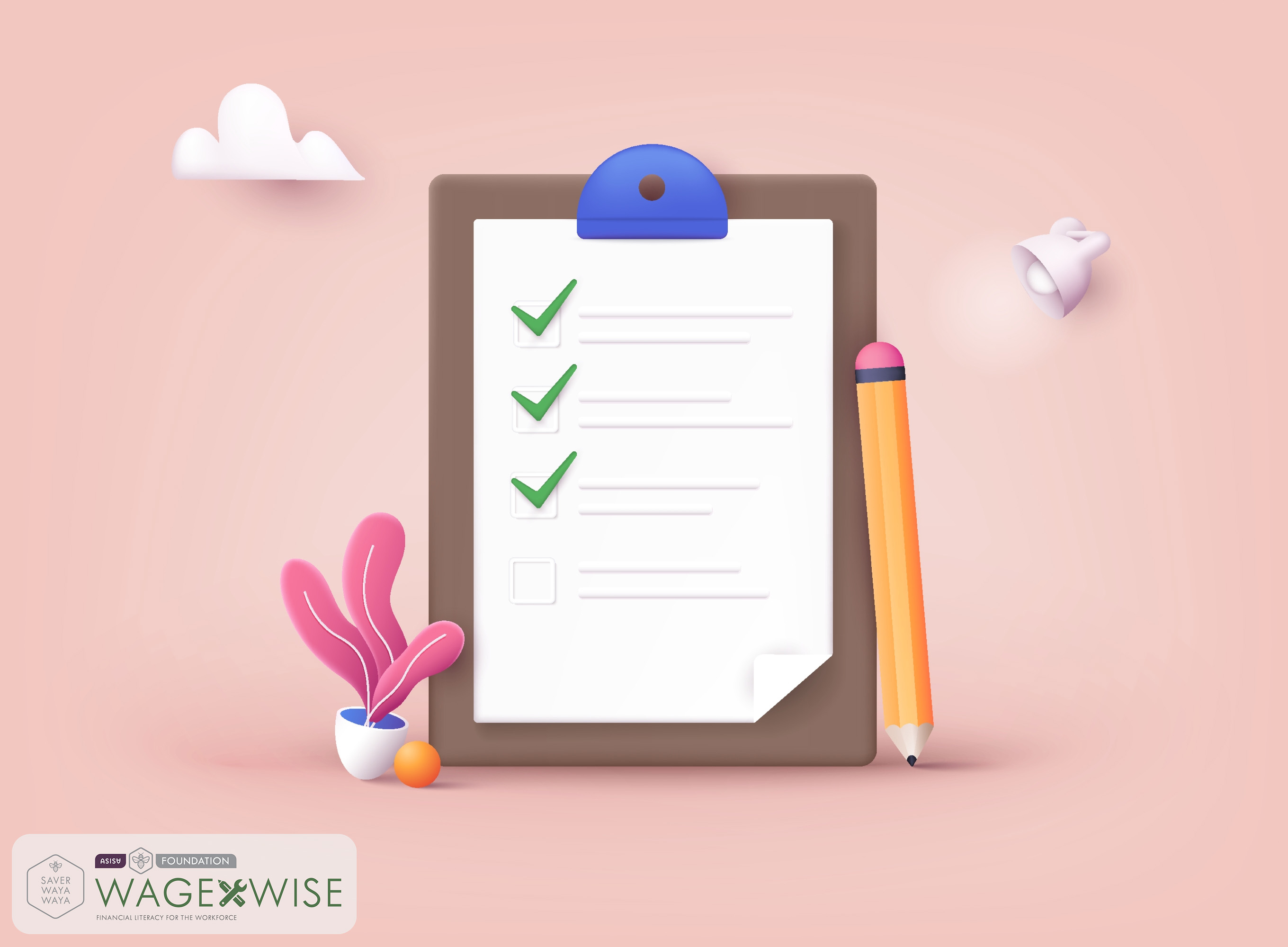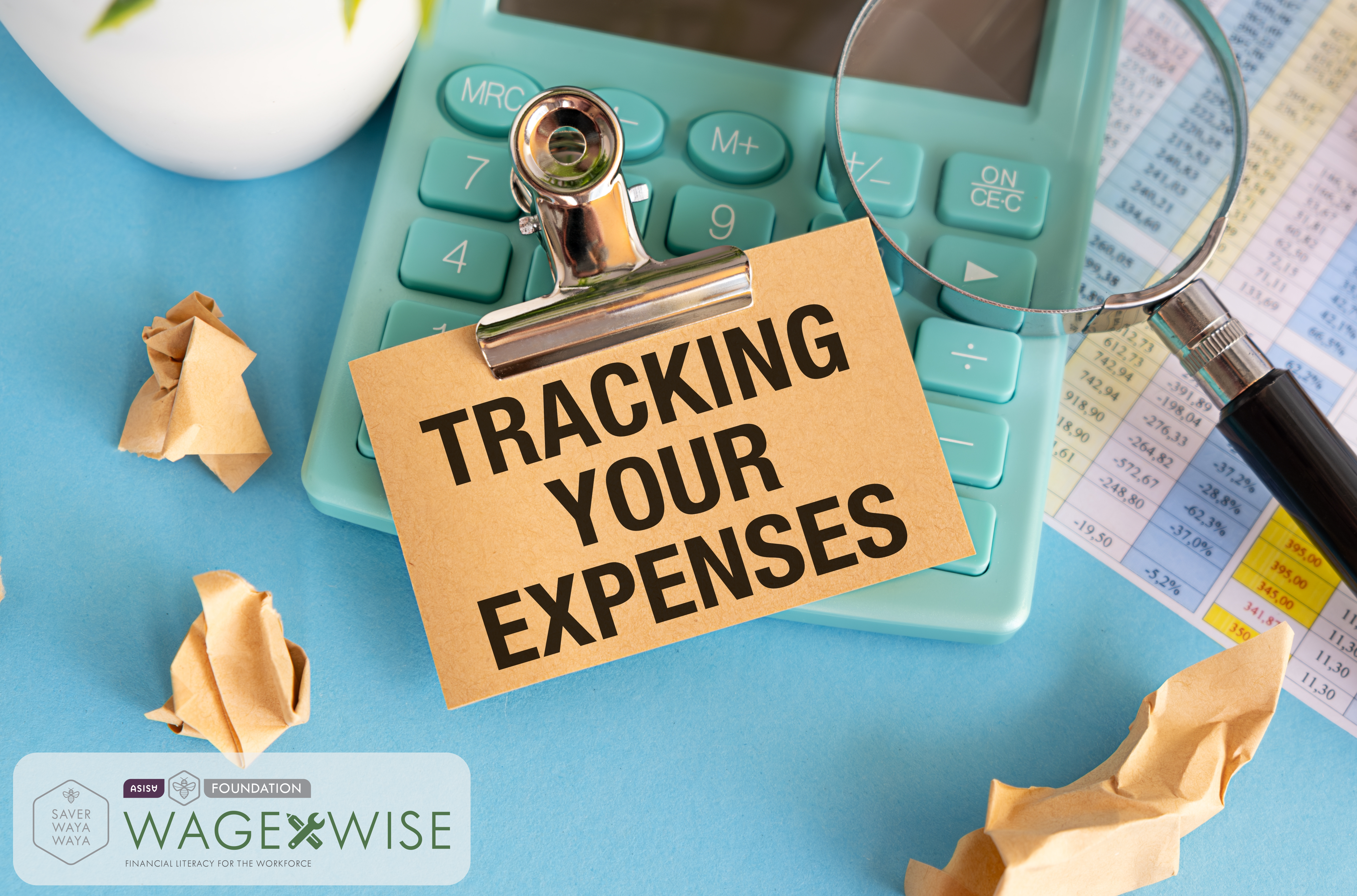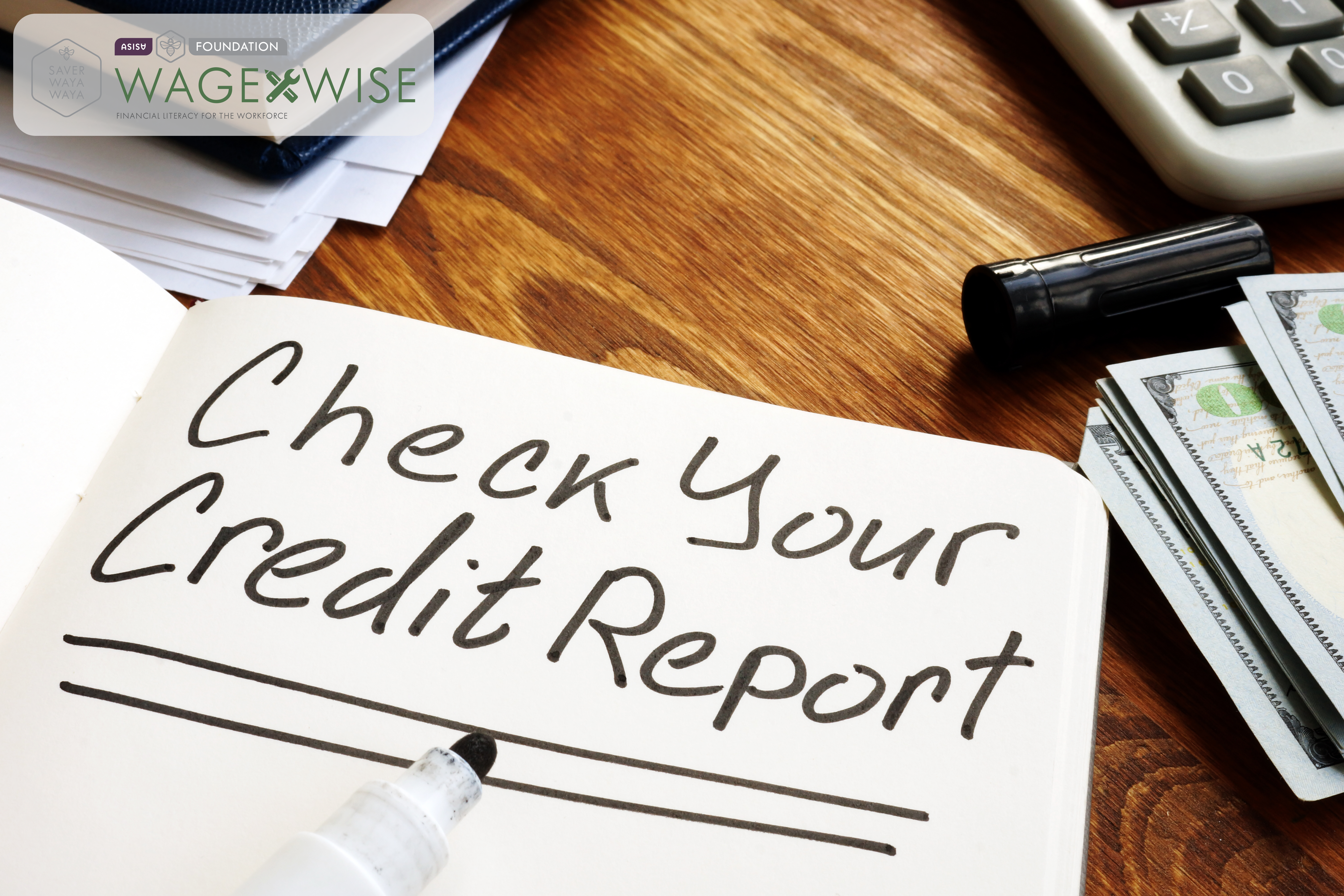

![]()
![]()
![]()
![]()
![]()
![]()
![]()
![]()
![]()
Get #WageWise
Saver Waya Waya WageWise is a consumer education programme, targeted specifically at workers. WageWise is a tried and tested financial education programme designed to give workers tools to effectively manage their finances. Strains on workers’ finances mean that they are not adequately prepared for paying for their children’s education, saving for retirement, or coping with unforeseen emergencies. Financial stress also impacts health and productivity, which ultimately affects employers. Financial education builds financial knowledge, capability, and resilience of workers.
The workers are accessed through their employers or through trade unions they may be affiliated with.
WageWise is supported by the Sanlam Foundation.
![]()
![]()
![]()
![]()
In today’s digital world, scams are everywhere – from fake investment deals to dodgy WhatsApp messages asking for your bank details. At WageWise, we believe knowledge is your best defence. This guide will help you stay safe when using mobile banking, digital wallets, and other online financial services.
Scammers are getting smarter – but so can you. Here are some of the most common types of digital scams in South Africa:
Real-life example:
Nomsa received an SMS saying her account was “under review” and she needed to click a link. The site looked like her bank’s page – but it was a scam. She lost R2,500 before she realised it was fake.
Your phone is a powerful financial tool – but only if you protect it.
If someone calls or messages asking for your login details, it’s a scam – hang up or delete the message.
It’s legal for authorised financial service providers (FSPs) to sell you funeral cover, insurance, or loans over the phone – as long as they follow the rules set out in the FAIS Act and give you all the necessary disclosures and documents. But scammers use these same methods to trick people.
Red flags to watch out for:
According to the ASISA Forensic Standing Committee, there’s been a sharp rise in scams where fraudsters impersonate trusted companies – even using real CEO names and logos on WhatsApp or Telegram groups to sell fake investment deals. These scams often target vulnerable people looking for job opportunities or quick returns.
Read more about this warning and how to protect yourself.
Remember, no legitimate insurer or investment firm will sell policies or request personal details over Telegram, WhatsApp, or social media DMs.
Your personal and banking details are valuable. Don’t give them away easily.
Think twice before clicking on links or downloading attachments – even if they look real.
If you’ve been scammed or spot a suspicious service, report it immediately.
You’re not alone. Many South Africans fall for scams – reporting them helps protect others too.
If something feels off – it probably is. Don’t be rushed. Take a moment to stop, think, and check before sending money, clicking a link, or sharing your info.
At WageWise, we want you to feel confident using digital tools to manage your money – safely and smartly.
![]()
Have you ever seen an investment deal that seemed too good to be true – like doubling your money in a week or earning “guaranteed” returns?
Scammers are targeting South Africans with fake investment offers that look legitimate. At WageWise, we want to help you protect your money by learning how to spot the red flags and what to do if you think you’ve been tricked.
Many scams target hardworking people looking for a way to grow their savings or get ahead. These offers are often shared on:
Scammers use real logos, photos of company executives, and fake testimonials to gain your trust. In some cases, they even pretend to represent reputable brands or CEOs.
According to ASISA, scammers have recently impersonated well-known financial companies using WhatsApp and Telegram to promise “once-in-a-lifetime” returns. In one case, unemployed teachers were targeted through a support group using a fake profile of a company CEO.
Read more about how these scams work.
If you notice any of the following, stop and do your homework before handing over your money:
Legitimate investment companies:
Tip: Before you commit to anything, look up the company’s name on www.fsca.co.za to make sure they’re licensed.
If something doesn’t feel right, don’t ignore it. Taking quick action can protect you and others.
If you haven’t paid yet:
If you’ve already paid:
Also report the bank account used by the scammer – this helps prevent others from being targeted.
Scammers rely on silence. By reporting fraud or sharing your experience, you’re helping protect your community.
If you see a post promising massive returns from a big company CEO in a WhatsApp group – don’t stay quiet. Ask questions, share warnings, and report them.
Final thought
At WageWise, we believe that protecting your money starts with confidence, caution, and community.
Remember: No real investment can promise high returns without risk. It’s okay to ask questions. It’s smart to double-check. And it’s brave to walk away from a deal that doesn’t feel right – even if others are buying into it.

At WageWise, we believe that financial empowerment starts with knowledge. Understanding your rights as a financial consumer is crucial when dealing with banks, lenders, savings companies, and insurers.
Many South Africans sign financial agreements without fully understanding the terms, leading to unexpected fees, penalties, and disputes. Knowing your rights can help you make informed decisions and protect yourself from financial harm.
If you need help addressing unfair treatment, you can contact one of these relevant authorities:
At WageWise, we help South Africans take control of their finances by making informed choices. Always read contracts carefully, ask questions, and don’t be afraid to walk away from deals that seem unfair. Financial literacy is your strongest tool for protecting your money.

WageWise exists to help South Africans make smart financial decisions. Every day, we hear about misleading financial products – deals that sound great but end up costing people money. Knowing how to identify red flags in financial offers can help you protect your hard-earned income.
At WageWise, we believe financial knowledge is power. Being cautious with financial products can save you from unnecessary debt or scams. Always ask questions, read contracts, and never feel pressured into signing agreements on the spot. Protecting your money starts with making informed choices.

February is the month of love, but Valentine’s Day doesn’t just have to be about romantic relationships. This year, why not focus on showing yourself some love by taking care of your emotional, physical and financial wellness. Here are five practical ways to boost your financial confidence this Valentine’s Month and beyond.
Taking control of your finances isn’t just about numbers; it’s about creating a sense of security and reducing stress in your life. When your finances are in order, you can face life’s challenges with confidence, knowing you have a solid foundation to cushion you. This month why not shift your perspective and start thinking about financial planning as a gift to yourself, one that can give your clarity. Knowing where you stand financially empowers you to make better decisions and reduces the anxiety that often accompanies the financial uncertainty that many people face.
Just like cleaning your space can clear your mind, organising your finances can give you clarity. Take sometime this month to review your accounts, track your spending, and categorise your expenses. Use our budgeting template to see exactly where your money is going and identify areas where you can cut back. Keeping your finances in order will build your confidence, helping you to feel more in control.
Financial goals aren’t just about paying off debt or saving for emergencies. They should also include things that bring you joy. Want to go on a holiday? Or finally buy that gadget you’ve been eyeing? Set a specific savings goal, break it into smaller, manageable steps, and watch your progress grow. Achieving these goals will reinforce your ability to manage money and give you a sense of accomplishment. Learn more about how to save here.
Celebrating yourself doesn’t have to break the bank. Allocate a small portion of your budget to treat yourself to something special, whether it’s a night in with your favourite snacks or a self-care splurge like a manicure. These little acts of kindness toward yourself remind you that financial wellness doesn’t mean deprivation. They also boost your confidence by proving you can balance responsibility with enjoyment.
Take time to reflect on your financial wins, no matter how small. Paid off a bill? Stayed within budget for the month? Give yourself credit for your efforts. Acknowledging your progress motivates you to keep going. Remember, progress, not perfection, is the goal.
This Valentine’s Month why not redefine love by including ourselves in the equation. Boosting your financial confidence is one of the greatest gifts you can give yourself!

Financial wellness is more than just having money in the bank. It’s about feeling confident and in control of your finances, knowing you can handle both expected and unexpected expenses, and having the freedom to make choices that improve your quality of life.
When was the last time you sat down and truly spent quality time with your finances? Just like any relationship, your financial health needs regular attention and care. That’s why it’s time to start dating your finances. Think of it as a dedicated time to reconnect, review, and realign with your financial goals. Here’s how you can get started:
Schedule a monthly budgeting date with yourself
Set aside a specific day each month to sit down with your budget. During this ‘financial date’, review your spending habits, savings progress, and any upcoming expenses. This practice helps you stay on top of your money and avoid surprises. It can also help you to manage the rising cost of living in South Africa.
Reflect on your financial goals
Use this time to check in on your short-term and long-term goals. Are you saving for a holiday, paying off debt, or building an emergency fund? Celebrate your progress and adjust your plans if necessary. Regular check-ins ensure you stay aligned with what truly matters to you.
Make it enjoyable
Who says finances have to be boring? Pour yourself a cup of coffee or tea, play some relaxing music or buy your favourite treat to enjoy so you can make your financial date an enjoyable experience. This positive association can help you look forward to the process rather than making it feel like a chore.
Strengthen the relationship
By giving your finances regular attention, you’ll gain a clearer understanding of your money and build confidence in your financial decisions. A little effort each month can lead to a healthier, stress-free financial future.
Start dating your finances today and watch as this simple habit transforms your relationship with money.

The New Year is the perfect time for fresh starts and setting goals and not just fitness goals. The new year is a great time to think about your finances. Do you want to reduce your debt, save for something special or start investing for your retirement a little planning in January can go a long way!
Why set financial goals?
Think of financial goals as your roadmap. Without them, it’s easy to drift and lose track of your money. Clear goals help you: stay motivated, track your progress and can also help you build a healthier relationship with money.
Setting financial goals takes 3 steps:
Think about what you want to achieve this year and why it’s important to you. Then write down your goals (make sure they are specific and achievable and have a set timeframe).
Example: Instead of saying, “I want to save money,” try “I will save R100 a month for the next 12 months to build a R1 200 emergency fund.”
Many people think that financial goals are boring and are very serious but with a bit of creativity you can make the process fun too.
Many people feel overwhelmed if they have to set big goals. So why not set a series of small goals so it’s easier to make steady progress. And don’t forget to celebrate your achievements along the way!
Financial resolutions don’t have to be complicated, choose one or two goals that feel doable. If you commit to making small, consistent changes, by this time next year, you’ll be amazed at what you’ve achieved.

As the year draws to a close, it’s the perfect time to take a step back and reflect on your financial journey in 2024. Did you achieve your savings goals? Were there any surprises along the way? And most importantly, are you on track for a better financial future?
Doing a year-end financial review doesn’t have to be complicated or stressful. It’s simply about understanding where you are financially, celebrating your wins, and planning for what’s next. Here’s how to keep it simple and impactful:
Before you jump into planning for the future, take a moment to reflect on the past year.
Tip: Write down three financial decisions you’re proud of and one thing you’d like to improve.
Take a closer look at where your money went this year. Were there areas where you overspent? Or did your priorities change? Use this review to fine-tune your budget for the new year. For example, if you spent more than expected on takeaways, consider setting a monthly limit to help you stay on track.
Tip: Use our budget template to track trends in your spending so you can plan accordingly.
The start of a new year is a great opportunity to set fresh financial goals or adjust existing ones. You need to think about your short-term goals. These might include starting an emergency fund, paying off a loan. Don’t forget your long-term goals especially planning for your retirement, saving for your child’s education.
Tip: Break bigger goals into smaller, more manageable steps to stay motivated.
Life is unpredictable, but your finances don’t have to be. Prepare for the unexpected by having an emergency fund. Also review your insurance coverage to ensure it meets your needs.
Tip: Start small, set aside just R100 per month to grow your emergency fund.
If you share finances with a partner or have kids, make this a family activity. Talk about shared goals for 2025 and how everyone can contribute.
Tip: Use visuals like a savings chart or a family savings jar to keep everyone engaged.
A new year isn’t just about numbers—it’s also about attitude. One small thing you can do is commit to learning more about personal finance through books, podcasts, or community workshops.
Tip: Follow WageWise on Facebook to gain practical tools and tips for managing your money in 2025.
Ready, set, go!
Your year-end financial review doesn’t have to be perfect—it just needs to happen. By reflecting on the past year and planning for the next, you’re setting yourself up for success. Remember, small steps today can lead to big changes tomorrow.
Here’s to a financially wiser 2025!

It’s that time of the year! For many lucky South Africans, December brings not just festive cheer but also a 13th cheque or annual bonus. While it’s tempting to splurge it all on Dezemba vibes, this extra cash can be a golden opportunity to boost your finances and set yourself up for success in 2025.
Here’s how to make the most of your bonus while still enjoying the festive season.
If you have debt, like credit cards or store accounts, consider using your bonus to reduce or settle it. Clearing debt saves you money in the long run because you’ll pay less interest.
Tip: Start with the debt that has the highest interest rate. Even a partial payment can make a big difference.
An emergency fund is like a financial safety net—it’s there when life throws you an unexpected curveball, like car repairs or medical bills. Aim for three to six months’ worth of living expenses, but even starting with R100 can provide peace of mind.
Tip: Set up a separate savings account for emergencies to avoid dipping into it for non-essentials.
Your bonus can be the perfect way to start—or grow—your investments.
Tip: Chat with a financial advisor to find the best investment option for your goals.
It’s okay to celebrate your hard work! Set aside a portion of your bonus for something you enjoy, whether it’s a holiday, a new gadget or treating your family. The key is to plan your spending so you don’t overdo it.
Tip: Remember the 50/30/20 rule—allocate 50% to financial goals, 30% to needs, and 20% to treats.
Use your bonus to lighten the load in the new year. Pay school fees or buy school uniforms, stationer or textbooks early to avoid January stress. You might also want to buy bulk groceries or prepaid electricity to save money later.
Tip: January is notorious for being a long financial month. Plan ahead to avoid starting the year in debt.
The Bottom Line
Your bonus is a chance to build a better financial future while still enjoying the present. Whether you pay off debt, save, invest, or treat yourself, the key is to be intentional about how you use it.
Make your money work for you this holiday season—and set yourself up for a financially wiser 2025.

Black Friday is just around the corner! the excitement for shopping and sales can be overwhelming. While it’s tempting to dive into the many deals available, it’s crucial to prioritize your financial health Here’s how you can prepare and make the most of your shopping without breaking the bank.
Before the shopping frenzy begins, create a budget based on your actual needs. Consider your essential expenses. By defining what you truly need, you can resist the urge to splurge on items that won’t add real value to your life.
Before making a purchase, ask yourself if it’s really necessary. Is it something you need, or is it just a reaction to the sales around you? Impulse buying can lead to regret later, especially if you end up with items you didn’t truly want or need. Taking a moment to reflect can save you money and help you make better decisions.
While using credit cards might seem convenient, it can lead to overspending and accumulating debt. Stick to cash or a debit card to help you stay within your budget. If you can’t pay for something upfront, consider whether it’s worth buying at all.
Reduce your exposure to adverts and sales promotions. You might avoid the shops over Black Friday weekend. The less you see the deals, the less tempted you’ll feel to buy items you don’t need.
This Black Friday make a conscious effort to stay financially fit by shopping only for essentials. By setting a budget, prioritizing your needs you can enjoy the season without the stress of unnecessary expenses.

The Black Friday sales and festive season can be exciting, with countless deals and discounts tempting you to spend. However, it’s crucial to navigate this time carefully to avoid falling into debt or overspending. Here are some practical tips to help you manage your finances effectively during this shopping frenzy.
Creating a budget is essential to managing your finances during this season. Start by determining how much you can afford to spend on gifts, food and new year expenses like school uniforms without straining your finances. Include only the amounts you can realistically allocate without impacting your essential expenses. Regularly review your budget to ensure you stay on track.
Before diving into the sales, make a list of essentials that you need and may be able to find at a good price during Black Friday. This list should help prevent impulse purchases. Stick to your list while shopping and avoid adding items that are not necessary.
Keep track of your spending to ensure you don’t exceed your budget. Use our budgeting template or even a simple notebook to record your expenses. Monitoring your spending in real-time will help you stay accountable and identify areas where you might be overspending.
It’s easy to confuse needs with wants during the festive season, especially with so many sales promotions around. Before making a purchase, ask yourself if it’s something you genuinely need or just a desire sparked by the festive atmosphere.
While credit or store cards can be convenient they can lead to overspending if not managed carefully. Try to use cash or a debit card for your purchases to help you stick to your budget. If you do use a credit card, only spend what you can pay off in full when the bill arrives to avoid accumulating debt.
If you have specific big-ticket items in mind, plan ahead and save for them. Rather than relying on credit, set aside money throughout the year for those larger purchases. Research prices to ensure you’re getting the best deal and avoid making impulsive decisions during sales.
Consider withdrawing a specific amount of cash for your festive season spending. Once that cash is gone, resist the urge to spend more. Using cash can make it easier to track your spending and prevent you from overshooting your budget.
Navigating Black Friday and the festive season can be thrilling, but it’s essential to approach it with a clear strategy to avoid debt and overspending. By setting a realistic budget, tracking your spending, and focusing on essentials, you can enjoy the holidays without the stress of financial strain.

A will is essential for anyone who wants control over how their assets are distributed after their death. While many think wills are only for the wealthy or elderly, in reality, anyone who owns property, has savings, or wants to leave specific instructions for their loved ones should have one. If you have children, a will is crucial for nominating a guardian to care for them in case something happens to you.
What is an asset? An asset is anything of value that you own, which can be converted into cash or used to provide future benefits.
Who needs a will?
How to write a Will
By having a will, you ensure that your wishes are respected, your assets are distributed as intended, and your loved ones are protected.

Estate planning is an important step in ensuring your loved ones are cared for after you're gone. A will is at the heart of this process. It’s a legal document that outlines how your assets, such as your home, savings, or personal belongings, should be distributed. Without a will, the law decides how your estate will be divided, which may not align with your wishes.
A will can ensure that minor children are taken care of by a guardian of your choosing and that your family inherits more quickly.
Estate planning can also help to minimise taxes and legal complications. Another benefit of estate planning is that you can make plans for management of healthcare and financial decisions during your lifetime if you're unable to make them yourself.
Estate planning goes beyond just making a will. It involves thinking ahead to protect your family and your assets. Let’s explore what makes up a valid will and the key elements of effective estate planning.
What makes a valid will?
To ensure your will is legally valid, it must meet certain requirements:
Things to keep in mind:
Key Elements of Estate Planning
Why It Matters
Estate planning provides peace of mind. It allows you to control what happens to your assets, avoids confusion or disputes among family members, and ensures your wishes are respected. Without it, the legal process may take time and cost more, creating stress for those left behind.
By taking the time to plan ahead, you protect your loved ones and secure your legacy.

Saving money on everyday expenses can seem challenging especially with the cost of living rising every month. But with some planning and small changes to your habits, you can reduce your spending so you have more to save. Here are some practical tips to help you manage your finances better:
One of the simplest ways to cut unnecessary spending is to have a "no-spend day" each week. On this day, challenge yourself to avoid spending any money. By focusing on using what you already have, like cooking at home or finding free entertainment, you’ll be surprised by how much you can save by simply pausing your spending for just one day.
When considering non-essential purchases, give yourself a cooling-off period of 30 days and put the money you would spend on this item into savings. If you still want the item after a month, you can buy it guilt-free. Often, you’ll find that the initial desire fades and you’ve already saved the money.
For many items, such as clothing, furniture, and electronics, consider buying second-hand. You can find quality goods at a fraction of the price by exploring second-hand stores, WhatsApp groups, or platforms like Facebook Marketplace. Not only is this an excellent way to save money, but it's also more sustainable.
Meal planning is a game-changer when it comes to reducing your grocery bill. By planning your meals for the week and making a shopping list based on those meals, you can avoid impulse buys and reduce food waste. Stick to your list when you shop to ensure you’re only buying what you need.
Timing your purchases can lead to significant savings. Plan ahead and shop during annual sales or promotions when prices are lower. Additionally, consider buying in bulk for items you use frequently - it saves you the time and money spent on multiple trips to the shops.
It’s easy to lose track of subscriptions and recurring payments. Go through your bank statements and identify any recurring payments for services you no longer need or use. Cancelling these subscriptions can free up money for you to save.
Conclusion
By implementing these money-saving strategies, you can free up a little extra cash that you can direct to savings for emergencies or your medium or long-term goals.

Saving money can be a daunting task, especially if you’re working hard for a modest wage and the cost of living seems to increase by the week. But developing healthy savings habits can bring financial stability. Here are some practical tips to help you save money.
Creating a budget is the foundation of good money management. Start by tracking your income (how much money you earn including things like grants) and expenses to understand where your money is going. Allocate specific amounts for essentials like rent, water and electricity, transport and groceries. Then find areas where you can cut back. A clear budget helps you see where you can save, even if it's just a small amount each month.
No matter how tight your budget is, make it a priority to save a portion of your income before spending on anything else. This could be as little as 2% of your salary. The key here is consistency – a small amount every month adds up. If possible automate this process on your banking app, so the money goes directly into a savings account before you have a chance to spend it.
Start by setting small, realistic savings goals. Whether it's R50 – R100 a week, setting achievable goals makes saving less intimidating and helps you get started and continue to save. Over time, these small amounts will build-up and seeing your progress can motivate you to save more.
Using cash instead of cards for all your non-essential purchases can help you stay within your budget. Withdraw a set amount of cash each week for this non-essential spending, and when it's gone, you know it’s time to stop. This can help you become aware of your spending habits.
An emergency fund is essential, especially when you’re living month to month. Start with a goal of saving R500 to cover unexpected expenses, like an unexpected medical bill. Having this safety net can prevent you from falling into debt when surprises arise.
Avoid using credit for non-essentials and if you do have debt, focus on paying it off as quickly as possible. You can also consult a financial adviser for advice on consolidating debt or negotiating lower rates with creditors.
Understanding how to manage money effectively is an important life skill, especially when you’ve got a limited budget. Keep checking back regularly with WageWise for our free education resources to learn more about budgeting, saving, and investing. The more you know, the better equipped you’ll be to make smart financial decisions.

Have you ever wondered why some people breeze through loan applications while others struggle? The secret might be hiding in plain sight – a good credit score. Your credit score is one of the most important things people look at when checking your finances and ability to get credit. It shows how you manage your money, if you pay bills on time, and if you live within your means. Think of it like the first impression you make with your appearance. Just like you put effort into looking good, your credit score needs attention because it says a lot about you.
Credit scores play an important role in our financial lives as they affects our ability to secure loans, and in some cases, even jobs. A poor credit score could result in you being denied credit or given credit at higher interest rates than those with better scores. Let’s look at the importance of credit scores and how they impact your financial well-being.
Factors that affect your credit score
Your credit score is influenced by several key factors. Understanding these can help you manage and improve your score. Here are some of the factors that affect your credit score:
Understanding and managing your credit score is a crucial part of your overall financial well-being. A good credit score not only helps you get loans and lower interest rates but also provides peace of mind and financial stability. By keeping an eye on your credit score and taking steps to improve it, you can ensure a healthier financial future.

Your credit report is an important document that reflects your past management of credit and helps predict how you may handle it in the future. This report includes a credit score, a three-digit number indicating the level of risk you present as a borrower. Regularly checking your credit report is crucial for maintaining a healthy financial status. By reviewing it, you can spot and correct inaccuracies, improve your credit habits, and detect signs of fraud or identity theft early. Staying vigilant with your credit report ensures you are well-informed and able to take proactive steps to manage your financial health effectively.
Why your credit report matters
Your credit report provides a detailed overview of your credit history. It includes personal details such as your name and address, along with your employment history, documenting both current and past jobs. The report also covers property details, noting any properties you own or have owned. It offers information about your credit accounts, including the amount of credit available, limits, and payment history. Additionally, it shows your current credit usage, reflecting how much of your available credit you are using. The report tracks how long you’ve been using credit and your past payment behaviour. It also records recent credit applications and any inquiries made into your credit, as well as any information like late payments, defaults, or legal judgments against you.
How credit bureaus operate
Credit bureaus play a key role in managing and collecting credit information. They are required to be registered with the National Credit Regulator (NCR) and must adhere to strict regulations to ensure the accuracy of the data they hold. They must report their activities to the NCR and follow data accuracy standards. If you report errors in your credit report, the bureaus are obligated to correct these mistakes without charging you any fees.
Why check your credit report?
Regularly checking your credit report is essential for maintaining a healthy financial profile. It allows you to identify and correct any errors or outdated information. If you find inaccuracies that the credit bureau does not address, you can escalate the issue to the Credit Ombud or the National Credit Regulator (NCR).
Monitoring your credit report also helps in detecting signs of credit card fraud or identity theft early, which can prevent significant damage to your financial status. By understanding how your financial behaviours, such as missed payments or defaults, impact your credit report, you can better manage and improve your credit score.
Additionally, regular reviews enable you to recognise weaknesses in your credit profile and take active steps to enhance your score before applying for new credit.
Free access to your credit report
You are entitled to one free credit report from each NCR-registered credit bureau annually. This free access allows you to regularly monitor the accuracy of the information on your credit report, ensuring it remains correct and up-to-date. It also helps you stay informed about your credit status, enabling you to make necessary improvements and maintain a strong financial profile.
Keeping a close eye on your credit report is a vital part of managing your financial health. Regularly reviewing your report not only helps you catch and correct errors but also gives you a chance to address poor credit habits and spot fraudulent activities early. By understanding your credit score and the details of your credit report, you can make informed decisions, protect yourself from potential financial issues, and work towards a stronger credit profile. Staying proactive about your credit ensures that you’re prepared for future financial opportunities and challenges.

From 1 September 2024, saving for retirement in South Africa is changing with the introduction of the Two-Pot Retirement System. This new system is designed to offer some relief during tough financial times, while still ensuring members of retirement funds have enough saved for retirement.
What’s Changed?
In the past, as a member of a retirement fund, you could only access your retirement savings when you reached retirement age, resigned, or were dismissed. The new system allows members of retirement funds to make limited withdrawals from their retirement savings once every tax year. This can help members to cope with financial emergencies without jeopardizing their financial future.
Key Points
How It Works
There are actually three pots at the start: The Vested, Savings and Retirement Pots
The once-off event:
The Vested Pot: On 31 August 2024, all your existing retirement savings will go into this pot.
The Savings Pot: From 1 September 2024, 10% of your Vested Pot (up to R30,000) is transferred to this pot as a one-time event.
Ongoing contributions:
From 1 September 2024 onwards a third of your retirement contributions goes into the Savings Pot.
The Retirement Pot: From 1 September 2024 onwards, 2/3 (two-thirds) of all new retirement contributions go into your Retirement Pot.
Remember all the funds in the various pots count towards your total retirement savings.
Accessing Your Savings Pot
You can withdraw money from your Savings Pot once every tax year, the minimum withdrawal is R2,000. However, be cautious and give it some thought:
Making the Right Decisions
It’s tempting to dip into your Savings Pot for every financial need, but it’s important to use it wisely. Emergencies like unexpected lifesaving medical bills might justify a withdrawal, but everyday expenses should not.
Seek Professional Advice
Managing your retirement savings can be complex. A certified financial advisor can help you make informed decisions. They can explain your options and the consequences of withdrawing from your savings in a clear and understandable way.
Start planning
The Two-Pot Retirement System offers flexibility and security, balancing immediate financial needs with long-term savings goals. It’s important to save as much as possible for your retirement to avoid financial hardship in your older age. Start planning today!
Remember, it’s up to you to ensure your financial security. Don’t rely on your children or friends and family to support you in old age. Be proactive and responsible with your retirement savings. By using the Two-Pot system wisely, you can enjoy peace of mind knowing you are saving for your retirement and can have some limited access in the case of a serious emergency.

This savings month, save for your future self by balancing your short-term and your long-term needs carefully. Retirement might seem far away, but it’s never too early to plan for your golden years. The power of compound interest means that putting away even small amounts now can make a big difference later. So why wait? Let’s explore why saving for retirement is important and how you can benefit from compound interest.
Why Save for Retirement?
Saving for retirement is one of the smartest things you can do for your future. It gives you peace of mind, knowing that you have saved for a comfortable retirement. Despite financial pressures like school fees or paying off debt, it’s important to maintain your retirement savings. Budgeting wisely means you can meet your current needs, cut down on spending, and consistently save for retirement. This ensures you’ll have some provision for your future needs.
What is Compound Interest?
Compound interest means that the money you save earns interest, and if you leave it invested, the interest also earns more interest. So, if you start saving at 30 or 35 and keep saving until retirement at around 65, your money will grow significantly over the years. Your retirement savings are invested in things like shares, bonds, and property, which helps your money grow even more. It’s important to keep saving and stay invested to benefit from this compounding growth.
Common Mistakes to Avoid
Saving for retirement may seem daunting so learn about different types of retirement investments and consult with a financial adviser. By starting early and staying invested, you can ensure that your retirement savings benefit from compound growth over a long period. Don’t delay saving for your future – start as early as possible to give yourself more options when it’s time to retire.

As many young adults prepare to enter the job market, it's important to equip them with the financial knowledge they need to succeed. This blog will offer valuable tips on managing finances as a young professional and building savings habits during learnerships, part-time jobs, and internships.
Be financially literate.
Financial literacy is the ability to understand how money works. It involves making informed decisions about budgeting, investing, borrowing, and spending. These skills are necessary to navigate challenging situations, such as high levels of debt, low savings, and poor financial decisions. Developing good financial habits from a young age increases your chances of building a secure financial future. For those entering the job market, managing finances becomes even more critical.
Learn how to read your payslip.
Knowing how to read your payslip is vital for managing your money. Your payslip shows how much you earn and where your money goes. Look at your gross salary, which is your total pay before deductions. Check deductions like taxes, UIF (Unemployment Insurance Fund), and contributions to medical aid or a pension fund. This helps ensure you're being paid correctly and lets you plan your budget better. If something doesn’t look right, discuss it with your employer.
Use credit wisely.
As you start working, your chances of getting access to credit increase. While credit can be beneficial, avoid accumulating debt by using credit for essential purchases that you can pay off quickly. Be aware of the interest rates on any loans or credit cards you use and aim to pay off balances promptly to avoid high-interest costs.
Build and maintain good credit.
Having access to credit and managing it well can help build a good credit score. Paying your accounts on time is one of the most critical factors in determining your credit score, and a good credit score makes it easier and less expensive to borrow money. If, on the other hand, you have no credit history, you may be considered just as risky as someone with a bad credit history, and lenders may be less eager to give you credit.
Review your credit report.
Your credit score is based on the information in your credit report. Sometimes, that information can be wrong. Check your credit report at least once a year to ensure you're being evaluated fairly.
Understand taxes and benefits.
Understanding how taxes work helps you make informed financial decisions and ensures you take advantage of any tax benefits and deductions. If your employer offers benefits like medical aid or retirement plans, use them effectively.
Spend and save wisely
There are many ways to spend your money, but with planning, you can spend wisely to meet all your needs and still have some left for your wants. Prioritise your needs over your wants and remember to save. The sooner you start saving, the more compound interest you will earn. Consider contributing to a pension fund or retirement annuity.,
Entering the job market is exciting yet challenging. By following these financial tips and developing good savings habits, young professionals can set themselves up for a secure and prosperous future. Living within one's means and making wise financial decisions are necessary steps toward financial independence.

Teaching young people about money is important. Developing saving habits as a family and having structured allowance approaches can help kids learn to budget and make wise spending choices. This blog covers some simple ways to encourage saving and teach budgeting skills to young people in your family.
Establishing family saving habits
Developing saving habits as a family promotes a collective approach to financial goals and teaches children the importance of saving money.
Setting financial goals as a family can create a sense of unity and shared purpose.
Children often mimic their parents, so demonstrating good financial habits is crucial.
A family budget helps everyone understand where the money goes and how to save better.
Allowance for kids
Implementing allowance strategies can teach children the value of money and how to manage it responsibly.
Deciding on an appropriate allowance amount is the first step in teaching kids about money management.
Tying allowance to chores can teach children the value of earning money through work.
Teaching kids budgeting basics helps them learn to manage their money effectively from a young age.
Teaching children about budgeting and wise spending
Teaching children about budgeting and wise spending choices equips them with essential skills for financial independence.
Making budgeting fun can engage children and help them learn important financial skills.
Encourage children to understand what the family’s needs are, vs the wants. The budget allocation must prioritise needs and when there’s something left, some wants can be included.
Using financial education resources can provide children with the knowledge they need to manage their finances effectively. Share some of the resources such as the WageWise Budgeting sheet. It will help to have some visual reminders in the home such as money box (piggie banks) and the visual reminders of the savings goals, you can use this template here to create your poster.
With consistent effort, families can build a strong foundation for financial success and literacy that will benefit children and build effective habits.

Debt can make it tough to reach your financial goals, whether you're dealing with credit card balances, student loans, store accounts or a bond repayment. The first step to getting on top of your finances is knowing exactly how much you owe. Understanding the types of debt you have—formal loans, instalment accounts, loans with friends and family, loans with informal lenders —is essential. This knowledge helps you plan effectively to manage and reduce your debt, setting the stage for a brighter financial future.
Understanding your debt
Not all debt is bad. It can be a tool for achieving important goals like buying a house, paying for education, or starting a small business. The problem starts when debt gets out of hand. It’s helpful to know the difference between 'good' credit, which can help you purchase goods that may increase in value or help you generate income, and 'bad' credit, like high-interest credit card debt used for everyday expenses. Having this knowledge can help you to plan carefully even before taking on credit.
Interest and how it impacts your debt
Interest determines how quickly your debt grows. Always aim to pay off high-interest debts first to reduce the amount you pay in interest. The quicker you pay off debt, the lower the interest you will pay.
Creating a debt management plan
Knowledge is power. Begin managing your debt by listing all your current debts—note down their interest rates, total amount owed, and monthly payments. This approach breaks your debt into smaller, manageable pieces.
If you're feeling overwhelmed by debt, consider speaking with a debt counsellor. They can assist you in managing your debt and improving your credit rating. Remember, debt counsellors only work with official financial institutions like shops, banks, and registered microlenders, not loan sharks. They can provide useful advice and support to help you achieve financial independence. Check with the National Credit Regulator first if the debt counselling company you are considering is registered.
Always budget
With a solid plan in place, your next step is to set up a budget. This helps you see where your money is going and prioritise your debts. Sticking to a budget helps you live within your means and escape the cycle of debt.
You are more than your debt
Remember, your debt does not define you or your future. Every payment you make is a step toward reclaiming your financial freedom. Stay strong, be patient, and be ready to adjust your plan as your life circumstances and the economy change. Celebrate each small win and know that each step forward builds your financial strength and independence.

In today's economy, managing your money is essential for everyone who earns a wage. Knowing how to handle debt, how interest rates can affect what you owe, and the best ways to pay off debts can greatly improve your financial security. Managing your money starts with really knowing what you earn and what you spend. To get ahead financially, it’s smart to make a budget that fits with what you want for your future. This means keeping track of all the money you bring home and where you spend it. Even if you don’t make a lot, it’s important to save a little. This helps you handle surprises and builds a safety net for tough times.
Understanding and managing interest
Interest is the cost you pay for borrowing money or the reward you get for saving it. It's shown as a percentage of the total amount you borrow or save. Understanding how interest rates affect your finances can help you make more informed decisions about loans, credit, and savings, leading to better financial health and planning. Whether you're looking at buying a home with a bond, financing a car, or saving money in a fixed deposit, knowing about interest will guide your financial plan. Here is how interest works when borrowing or saving money:
Interest when borrowing money
When you borrow money, like getting a loan to buy a car or using a credit card, the interest rate is what you pay extra on top of the amount you borrowed. For example, if you borrow R1,000 at an interest rate of 10% for one year, you'll have to pay back R1,100. That extra R100 is the interest, and it's how the bank or lender makes money for providing you the loan.
Before taking a loan or buying on credit, get quotes from a few financial services companies, compare the interest rate that each will charge you, it is better to go with a company that will charge you a lower interest rate.
Also check the loan term, you will often pay more interest if the loan is over a longer period. Over time, interest compounds meaning more interest is added on the interest already owing form previous months or previous years.
Interest when saving money
If you put your money in a savings account, the interest rate is what the bank pays you for keeping your money there. For instance, if you save R1,000 in a bank with a 5% interest rate for a year, at the end of the year, you’ll have R1,050. The extra R50 is what the bank pays you for using your money.
Approaches to debt repayment
To gain control over your financial obligations, start by listing all your debts, noting their interest rates from highest to lowest. Focus your repayment efforts on the debts at the top of the list since these accumulate interest faster, costing you more over the long term. If you feel overwhelmed seek help from qualified financial advisers or debt counsellors who can provide personalised advice based on your specific financial situation. They can help you understand complex terms and conditions of your debts, calculate the interest rates accurately, and suggest the most effective repayment plan. Professionals can help you recognise and avoid potential mistakes in debt repayment, such as the risks associated with certain types of consolidation loans.
The most popular methods for fast-tracking the debt-repayment process are the snowball and avalanche methods.
Focus on making the minimum payments on all your debts, then allocate any additional funds to the debt with the highest interest rate, potentially saving you significant amounts of money over time.
With this approach, continue to make minimum payments on all obligations but direct any extra money to the smallest debt first, regardless of the interest rate. When that debt is paid off, you use what you were spending to repay your smallest debt to pay off the next biggest debt. In that way you will use the extra money to tackle debt, you will pay off your debt sooner and won’t be tempted to use the extra money on other things.
When tackling debt repayment, it's important to have a plan that fits your financial situation and personal motivation style. Whether you use the avalanche method, the snowball method, or a mix of the two methods, understanding these methods and applying them effectively can greatly improve your ability to manage debt. However, navigating these methods can sometimes be challenging, especially when you’re trying to balance other financial responsibilities which is why seeking help is important. By understanding how interest affect your debts, choosing a repayment strategy that suits you, and avoiding unnecessary debts, you're creating a healthy financial environment for yourself.

Financial freedom can mean different things to different people. For some, it's about being able to cover their monthly expenses without worry. For others, it's the ability to save for a dream holiday or to retire comfortably. No matter what it means to you, one thing is certain: you need a good plan, some discipline, and sometimes, a bit of help from experts.
The power of budgeting
Budgeting is your starting point. It’s about knowing what you earn, what you spend, and how you can save a bit more. Think of it as planning your shopping list so you don’t end up buying stuff you don’t really need. Budgeting is like a roadmap that helps you manage your money wisely. It is also important to track your spending so you can clearly see where your money is coming from and where it's going. By having a budget and keeping track of your spending, you can make smart choices about how to spend and save your hard-earned money. Don’t only budget at the end of the month but throughout the month, keep track to see if you spending according to the plan. If you feel overwhelmed or don’t know where to start that’s where financial advisors can step in. They’re like coaches for your money, helping you set up a budget that fits your needs, so you can save up without missing out on what’s important to you.
Cutting down debt
Debt can be a huge roadblock on your way to financial freedom. Whether it’s from credit cards, store accounts or loans, paying it off can give you a real boost. There are tricks to make this easier, like tackling your smallest debts first or the ones with the highest interest. But figuring out the best move can be tricky. That’s when it might be a good idea to chat with a financial adviser, they know all the ins and outs and can help you find the fastest way to lighten that load.
How professionals can help
You don’t have to figure all this out on your own. Whether it’s setting up a budget or getting out of debt, there are professionals who’ve got your back. Financial advisers are like coaches for your money. They can work with you to create a budget that fits your life and help you make the most of your income. They can also give you advice on how to save for big things like a house or retirement, which are key to achieving financial freedom. Seeking help from professionals not only helps you make a practical plan for your money but also keeps you accountable and disciplined, which are crucial for reaching financial freedom.
Starting with a solid budget and tackling your debt are key steps towards financial freedom. But remember, it’s okay to ask for help along the way. With a good plan and the right support, you’re well on your way to getting the financial freedom you dream of.

Once you've gotten the hang of budgeting and brought down your debt, you're on the right track. But keeping your financial freedom is like staying healthy – it takes good habits and advice from those who know their stuff.
Developing good money habits is important for anyone looking to secure and maintain their financial freedom. These habits, such as saving regularly, spending wisely, and staying informed about financial matters, improve your financial health. Regular financial health checks are an integral part of these habits, acting as a personal review to ensure you're on track towards your financial goals. They allow you to adjust your spending, saving, and investment plans as necessary, highlighting areas that require attention before they become problematic. By adopting these practices and regularly assessing your financial health, you're not just safeguarding your current financial status; you're laying a strong foundation for your financial freedom. This approach helps you to lead a financially secure and fulfilling life where you are also prepared for financial challenges. Developing strong financial habits is crucial for keeping your finances on track. Here’s how to get started:
Building and keeping your financial freedom isn't just about big wins; it's about making smart choices every day. And remember, it's okay to ask for advice. Financial advisers are there to help you navigate the ups and downs, making sure you keep your financial health in good shape.

Know your rights and recourse as a customer
As customer, it's important to understand your rights when it comes to your financial services. Financial matters are very closely regulated and in accordance with South African law consumers have many rights and ways to exercise these rights to ensure their protection. By knowing your rights and where to turn when you encounter difficulties, you can ensure you receive fair treatment and navigate the complaints process effectively.
Know your rights
As a consumer you have certain rights that protect you from unfair treatment and unreasonable terms and conditions. Financial services providers must provide clear and transparent information regarding fees, interest rates, and other important details. Take the time to read and understand the terms and conditions before signing on for any financial product or service.
There are several acts in place to protect consumers, here are some rights and the acts you need to know as a consumer:
Your rights when it comes to credit agreements:
Your rights with insurance products:
What to do if you feel you’ve been mistreated
If you feel you have not been treated fairly by your financial services provider, the first step is to communicate with them. Contact their customer service department and explain the issue and your desired outcome. Often, issues can be efficiently resolved through open communication.
If communication with the service provider fails to provide a satisfactory result, take the issue to an external dispute resolution scheme or ombuds office established for this purpose.
If you need help in addressing unfair treatment that you feel you have received, you can contact one of the following authorities:
|
The National Financial Ombuds Scheme South Africa |
For complaints relating long-term insurance, short-term insurance, banking and credit queries. |
Tel: 0860 800 900 |
|
Financial Sector Conduct Authority |
To confirm that an institution, financial service providers or financial adviser is licensed. |
Tel: 0800 203 722 |
|
Ombud for Financial Services Providers or FAIS Ombud |
For complaints relating to a financial services provider. |
Tel: 086 066 3274 |
|
Pension Funds Adjudicator |
For complaints with pension, provident, preservation or retirement funds. |
Tel: 012 748 4000 or |
|
National Credit Regulator |
For matters relating to credit providers. |
Tel: 0860 627 627 or 011 554 2700 |
Knowing the appropriate process for laying complaints is important to getting the desired outcome. Gather all relevant documents, including account statements or communication received via email or SMS, when making your complaint. Explain the issue, providing all critical details and any available evidence.
Remember, you have rights, and there are established channels for you as a consumer to address complaints and get fair treatment.

Understanding the role of ombuds offices in resolving unresolved complaints
In South Africa many consumers find themselves in unresolved disputes with companies that may require a neutral third party to step in to ensure fairness prevails in these cases. There are many ombuds offices including the National Financial Ombuds Scheme South Africa and Office of the Ombudsman for Financial Services Providers. These ombuds offices provide an impartial and objective solution to customers who have exhausted internal complaints procedures but have not received any solution. Here are few things to know about the role of an of an ombuds office.
Ombuds offices offer an impartial and neutral resolution
Ombuds offices are impartial and independent and have expertise in resolving consumer complaints. They act as neutral mediators during the disputes and facilitate dialogue between consumers and providers.
Ombuds offices assess complaints objectively, taking into account all relevant factors ensuring binding and fair resolutions.
Benefits of using an ombudsman office
When a company fails to address your complaint for over a month, going to the ombuds office may be the next step to ensure your complaint is addressed. With an ombuds office, you have access to impartial mediators and cost-friendly and accessible dispute resolution processes that make sure the outcome is fair with unbiased decisions.
Ensuring binding and fair resolutions
One advantage of ombuds offices is that when they make a decision, it is binding on the service provider. This ensures that the provider treats you fairly and that the outcome provided is up to the established quality levels. To inform the decision, provide all the evidence and information necessary for the offices to evaluate.
By resolving unresolved consumer complaints and bringing about justice, ombuds offices play an essential role in creating a fair and accountable landscape. With enhanced consumer protection measures and an independent dispute resolution process, service providers are held to account, and issues are addressed. Remember, the ombuds offices exist to protect your rights as a consumer and provide you with a fair outcome in case of unresolved disputes.

Budgeting with your partner or family is not just about saving money. It's about working together to build a strong future. Here are some easy tips to help your manage money as a team and make your relationships even stronger.
Working together on a budget
When you budget with your family or partner, it means talking honestly about how you both think about money and how to use it. Will you put all your money together or keep it separate? How will you decide what to spend on things you both need and want? This is about understanding each other and making a plan that everyone is happy with. Read up on how you can complete your budget in five easy steps.
Talking about money
The best way to make a budget work is to talk about money openly. Have regular talks about how your budget is going. Listen to each other and try to understand different ideas about money. This helps you work together, not just look after your money.
Setting goals together
Making goals with your family or partner can be really fun. Think about what you want to have or do soon, or even in the future. Break these plans into small steps and have a little party when you achieve them. This is about sharing your dreams and working together to make them real.
Joint accountability
One of the main benefits of consulting with the whole family on budgets and savings goals is that each family member of partners supports and buys-in to the financial plans. This means that you’re more likely to be successful in your financial management plans. It also means that you are accountable to one another, this helps keeps things on track.
Tracking your spending
Keep an eye on what you spend. This helps you see where your money is going. You can do this by writing down your expenses, using a budgeting app, or checking your bank statements. This way, you can make sure you’re sticking to your budget and can find ways to save money if you need to.
Budgeting with your family or partner is about more than just money. It's about trust, having open and frank conversations, and planning your life together. When you work on money problems as a team, it makes you stronger as a family or couple.

Many people find talking about money hard, but discussing finances can really bring your family closer and is an act of self-love too. It’s not only about managing money well; it’s about growing, learning as a family, and creating healthy boundaries. Loving yourself means managing your finances responsibly and understanding your personal financial limits. This month of love show yourself some selflove by making conversations about money a regular, positive, and self-affirming part of family life, benefiting everyone involved.
Making money talk normal
Talking about money should be normal in families. In many families, money talk can be difficult but by having these conversations regularly means people will gradually start to feel okay about discussing money. You can take the initiative and be the first to start these talks. When you do this, everyone learns and feels more comfortable talking about money.
Teaching kids about money
It's great to teach kids about money early on. The sooner they start understanding how to manage money the easier it will be for them. Use simple lessons that match their age and real examples from everyday life. For school-going children you can give them an allowance (pocket money) to help them learn the basics from how to save for the things they want and how to budget. You can even involve younger children by asking them to help you write a shopping list, this can help them learn about the things the family needs and the things the family wants and how to balance these two. One of the benefits of learning early is that it isn’t just teaching them about money; it's about teaching them to be grateful, thankful, and generous too.
Solving money problems together
When money problems come up, try to solve them as a family. If a big, unexpected expense materialises, you can brainstorm ways as a family to cut down on luxuries to cover this emergency cost. You can also reflect on how you could have been better prepared for an emergency expense. Sometimes you might need help from a money expert, and that's okay. The important thing is to make decisions together and support each other. This makes your family stronger when facing tough times.
Respect personal boundaries
In embracing financial discussions within the family, it is also important to establish and respect personal boundaries. This means recognising each family member's comfort levels and privacy when it comes to money matters. Setting these boundaries is a form of self-care and respect for others. It encourages a healthy financial environment where everyone feels safe to share their thoughts and concerns without fear of judgment or overstepping. By doing so, you create a balanced space where financial conversations can thrive, rooted in mutual respect and understanding.
Talking openly about money in your family can bring everyone closer. By making money talks a regular part of family life, you not only address your current financial situation but also lay a foundation of financial literacy and wisdom for the next generation.

As we step into the New Year, it is a great time to think about not just new goals, but also new ways to manage our money. Here is how you can be #WageWise with your spending and set boundaries to avoid financial strain.
The first step in creating a new financial you is knowing your limits. It is easy to get carried away with spending, especially at the start of a new year when you are feeling optimistic. But remember, being realistic about what you can afford is key to staying on track.
Budgeting is not just about tracking expenses; it is about understanding your income and spending in a way that works for you. A good budget helps you see where your money goes and makes it easier to cut back on unnecessary spending.
If not managed properly, debt can be a big burden. This year, try to avoid taking on new debts, especially for things that are not important. If you need to buy anything on credit, have a clear plan how you will pay it back.
Not everything that catches your eye needs to be bought. Learning to prioritise your spending is a big part of creating financial boundaries. Ask yourself if something is a need or a want before you buy it.
It is easy to feel pressured to spend, especially when friends or family are involved. Remember, it is okay to say no if something doesn’t fit your budget.
Think about where you want to be financially in a year, five years, or even ten years. Having long-term goals can help you stay focused and make smarter spending choices.
This new year, let us focus on creating a financially savvy version of ourselves. By setting clear boundaries and being mindful of our spending, we can avoid financial strain and work towards a more secure and stress-free financial future. Remember, a new year is a chance for a new financial you.

The new year is a chance to reset and start afresh. While many of us focus on personal and professional resolutions, there's one area that tends to be overlooked: our financial health.
A financial health check is like a regular health check-up, but for your finances. It's a great way to look at your financial situation, identify areas that need improvement, and realign your financial plans with your goals. By doing a financial check you can see potential issues early and gives you a clearer picture of where you stand, financially.
Here are five things to look at during your financial health check.
Start by looking at your income and expenses. Are there areas where you're overspending? Could you be saving more? A thorough budget review helps in identifying unnecessary expenditures and potential savings opportunities.
Understanding your debt is important. This includes knowing the total amount of debt, the interest rates you're paying, and how it's structured. Create a plan to reduce your debt in a way that's realistic and sustainable.
Evaluate your current savings and whether they're aligned with your short-term and long-term financial goals. Also, review your investment portfolio. Are your investments performing as expected? Do they still align with your risk tolerance and investment goals?
Your insurance needs can change over time. Make sure your coverage, whether it's health, life, or property insurance, still meets your current needs and offers enough protection. It's also a good time to shop around for better rates or more comprehensive cover.
It's never too early or too late to plan for retirement. Assess your current retirement savings and whether they are on track to meet your retirement goals. No matter your age, it's smart to think about retirement. See if you’re saving enough. You might need to save more or change where you’re putting your money.
Once you’ve done your financial check, it's time to set your goals. With the help of a financial advisor, you can set goals that are measurable, achievable, relevant, and time bound. Remember, clear goals provide a roadmap for your financial journey through the year.
Once you've identified areas that need improvement and set your goals, the next step is implementation where you put everything into practice. This might be adjusting your budget, changing spending habits, or altering investment strategies. Regular monitoring of your progress is key to staying on track.
A financial health check at the start of the year is more than just a good practice; it helps you make informed decisions, sets you up for success, and brings peace of mind. So, as we embrace the new year, let's also embrace the habit of conducting an annual financial health check. It's one resolution that will pay dividends for years to come.

The festive season is here! It is a time for joy and celebration, but it can also mean spending a lot and it can be all too easy to overspend. However, with a little planning, you can enjoy the festivities without putting a strain on your wallet. In this blog post, we will share some smart ways to save during the festive season, ensuring that your December salary lasts through Januworry.
Understand your festive season expenses
The festive season is synonymous with expenses - from gifts and decorations to travel and social events. Before anything, take into account all your regular expenses for your needs, such as rent or bond repayments, groceries, electricity and water payments, debt repayments and insurance, and then allocate a portion of your salary for optional spending. Be mindful of not going overboard, instead focusing on spending within your means. With the holidays, your December salary may have been paid early, set aside money for debit orders that may be going off later in the month and remember to put aside some money for early January expenses including food, school stationery, school fees and other supplies.
Setting a festive budget
A pre-planned budget is your financial lifesaver during the festive season. Start by reviewing your regular expenses and determine how much you can comfortably use for festive spending. Before heading out to buy gifts or groceries, make a comprehensive shopping list. This will help you stay focused and avoid impulse buying. Stick to your list and resist the temptation to make last-minute purchases that may not be necessary. Leave your credit cards at home to avoid the temptation to shop and exceed the limit and list you had planned for. A realistic budget is one that covers your needs while allowing some room for those unexpected costs.
Smart shopping
One of the best approaches for festive shopping is to start early. Take advantage of sales throughout the year, keeping an eye out for gifts that match your loved ones' interests. Consider homemade gifts - they are not only cost-effective but also add a personal touch. If you are planning on buying gifts, always compare prices, remember, it's the thought that counts, not the price of the gift.
Entertaining on a budget
Hosting a festive get-together does not have to break the bank. Get creative with decorations, or reuse decorations from previous years. Food is a major part of the festive season, and it is easy to overspend on meals and parties. Instead, plan your meals and celebrations in advance. Consider the bring and share option where each guest can bring a dish. If you are preparing the food, decide on a few special dishes that you want to prepare, and then make a shopping list accordingly. This will not only help you save money, but also minimise food wastage.
The festive season should be a time of joy, not financial stress. By setting a realistic budget and being #WageWise you can save money and ensure that your December salary lasts through January. Enjoy the season while achieving financial stability.

Retailers want you to think that Black Friday is all about saving but really its about spending money. With all the hype about massive savings and discounts it easy to get excited and lose track of your spending.
All the specials are tempting but its only really a saving if it was something you need or something you have been wanting to buy for some time. If you have things you really need, or items you have been saving up for this is a good time to buy. But you should approach Black Friday with caution to avoid falling into debt. Maintaining your financial health while taking advantage of the sales requires careful planning, budgeting, and prioritising essential needs. Being debt-free and having peace of mind is better than accumulating unnecessary debt. Here are some tips to help you navigate Black Friday without ending up buried in debt.
Create a list of the items you genuinely need or have been planning to buy for a while. This will help you stay focused and avoid overspending on things you don’t need. Stick to your list and resist the temptation to overspend.
Before you even think about hitting the stores or online shops, it's important to set a realistic budget. Take a look at your finances to see if you can afford to spend and if so, how much you can afford to spend on Black Friday deals. By setting a clear spending limit, you'll be less likely to overspend and regret your purchases later.
Prioritise needs over wants, especially during Black Friday! The deals may seem good but remember the difference between a need and a want. Be sure to prioritise buying important items you need, groceries, toiletries, cleaning products as well as things like uniforms, school fees and stationery for the upcoming school year, before indulging in wants. This Black Friday, why not stock up on school shoes and stationery for the year ahead? Not only will you score great deals, but you'll also save yourself the stress of last-minute shopping in January. It's a win-win!
Black Friday ‘deals’ can be overwhelming, leading to impulsive buying. Take a moment before buying anything and ask yourself if it's something you truly need or if it's just a spur-of-the-moment decision. Giving it some thought can save you from regretting unnecessary purchases later.
Check out the pre-Black Friday prices of the items on your list of needs. This way, you'll know whether you're getting a good discount or not. Don't limit yourself to a single store, compare prices across different stores whether instore or online to make you're getting the best deal.
Remember, getting ready for Black Friday with a well-thought-out plan and financial discipline will allow you to enjoy the deals without the burden of debt. You can get those fantastic bargains while staying within your means.

It’s the season for Black Friday and Cyber Monday, and the excitement is building up. It's that time of the year when stores offer irresistible deals, and everyone is excited to grab the best bargains whether it is instore or online. However, with all the frenzy, it's easy to spend money that you ordinarily wouldn’t have. Here are some tips to help you navigate Black Friday like a pro, truly helping to you save and if you do decide to spend to do it safely.
Avoid shopping altogether
It may seem like Black Friday is all about saving for all the special deals but actually big brands and shops use these specials as an opportunity to get you to spend even more. So what is the best way to truly save? Don’t go shopping at all. That might be hard for some people but by staying away from the shops and offline you will save your money. Remember if a product is discounted from R500 to R300 it might seem like you’re saving R200 but actually you’re still spending R300, especially if you didn’t plan on buying that item in the first place.
Keep your money safe
Whether you're shopping online or in-store, there are some key things to keep in mind. When shopping online always uses strong, unique passwords for your online shopping accounts to protect your personal information. Consider using a virtual card for online shopping, it is more secure because it shields your actual bank card details, making them harder to steal. They're digital, so you can't lose them like physical cards, and you can easily monitor transactions, set spending limits, and receive alerts.
Do not give out your banking PIN or private details to people who call, send SMS’s or emails claiming to be your bank.
Watch out for scams!
With all the emails and promotions it is easy to be scammed around Black Friday. Be aware of suspicious emails and only click on links from trusted sources to avoid scams. Also only ever transact on legitimate websites (you can check they are secure by looking for https in the URL).
Be careful around SMS or email messages from sources you don’t know promoting sales, some of these messages may contain fraudulent links. There are fraudsters who sometimes create fake email and website accounts that may look similar to some of the well-known brands and stores.
Avoid using credit
Shops will often have ‘exclusive’ financing options such as zero-percent interest or "buy now, pay later" deals to entice you into using credit. While these offers may seem tempting, they can quickly spiral into debt traps if not managed wisely. If you do choose to take advantage of financing offers, make sure you understand the terms such as interest and can comfortably make the payments.
Consider using cash or your debit card to help you stay within your budget instead of using your store accounts, you eliminate the temptation to overspend and by using cash, you avoid paying interest. This way, you're more likely to stick to your set limit and purchase only what you can afford.
Open an investment or savings account
If you do really want to save you could even take it a step further and take the opportunity to put some extra money into your savings account over Black Friday, this way you’re actually earning money through the interest you earn.
You could also research investment options that may be on offer around Black Friday that offer great interest rates.

In these tough economic times, the importance of sound financial planning cannot be taken lightly. Today’s world is filled with financial temptations and easy access to credit, making it even easier to fall into debt traps. While the glamour of immediate gratification may be strong, the long-term consequences of poor financial choices can be devastating.
Financial planning isn't just about maths; it's about making sure your future is safe, and you don't have to worry about money problems. Unfortunately, many people don't realise how important financial planning is, so they don't do it. If you don't plan for your money well, it can really mess up your financial health.
By taking charge of your finances and sticking to a plan, you will not run into money troubles, and you will be on your way to building a secure financial future.
It's important to know that if you haven't been good with planning for your money, it doesn't mean things can't get better. You can start making positive changes to your financial health right now. Here are some steps to begin with:
Managing your money wisely, at different life stages, can be challenging but it's never too late to change your financial course. With a bit of effort and the right approach, you can rewrite your financial story. Don't let poor financial planning hold you back from the life you deserve.

Not planning for your money can cause big problems now and later. It can lead to lots of debt, not having enough savings, not knowing if you'll have enough money when you retire, and even causing fights with people you care about.
It's important to always plan your money right, with a good plan and self-control, you can avoid these problems and make your financial future better. Checking your money regularly is like looking at a school report at the end of each term. Are you saving more? Are you getting closer to your money goals? It helps you see how you're doing financially.
Here are quick tips to conduct financial check-in.
Check your financial statements: Start by collecting all your financial statements, including bank statements, account statements, credit card statements, and any other financial documents to get a good view of your current financial situation.
Review your budget: Check your budget to see if you've been sticking to it. Look for any overspending or where you can make changes.
Check your debt: Have a look at your outstanding debts, including balances, interest rates, and payment schedules. Are you making progress in paying down your debt?
Check your emergency fund: Make sure your emergency fund has enough money. Financial experts typically recommend having three to six months' worth of living expenses in your emergency fund.
Set new goals: Based on your review, set new financial goals or adjust existing ones. Whether it's saving for a holiday, retirement, or paying off a loan, clear goals provide motivation and direction.
Plan for future expenses: Consider any upcoming expenses or financial milestones, such as school fees, home renovations, or buying a new car. Make sure your financial plan includes these future needs.
Regular financial check-ins are the key to staying financially fit. They provide you with a clear understanding of your financial situation, allow you to adapt to life's changes, and help you achieve your financial goals. Just like a fitness routine, consistency is important. So, set a schedule for your financial check-ins with your financial adviser and make them a regular part of your financial routine. By doing so, you'll be well on your way to achieving financial success and security. With the guidance of an accredited financial advisor, you can avoid financial mistakes and work toward a secure future. Having a financial advisor is an investment in your financial well-being and peace of mind.

There is no better time than now to take control and create your own roadmap of the future. As life's journey unfolds, it is important to make sure that your wishes are honoured, and your belongings are managed according to your desires. Planning for what happens after you're gone is something everyone should do, no matter how much money they have. It's not just about money—it's about making sure your family is okay and your wishes are followed.
Creating a will is one of the most important steps you can take to ensure that your wishes are carried out after your passing. While the thought of drafting a will might seem overwhelming, it is an essential document that provides clarity and peace of mind to both you and your loved ones.
Life is unpredictable, and none of us can see what the future holds. While it might not be the most comfortable topic to talk about, creating a will is an important step in managing one’s financial affairs.
Simply put, a will, also known as a last will and testament, is a legal document that outlines how you want your assets and belongings to be distributed after your death. It also allows you to designate a guardian for your minor children and specify your preferences for funeral arrangements and other important matters.
Below are top 3 reasons why you need to consider creating this important life document of your own.
Most people think that you need a will if you have many assets and lots of money, but a will is necessary for everyone. You can have a will if you are in one or some of the following categories:
Since the purpose of a will is to speak for you when you no longer can, not having one could mean:
A well-drafted will can help prevent family fighting and disputes by providing clear and legally binding instructions for asset distribution. When your wishes are clearly outlined, there's less room for disagreements among family members, reducing the likelihood of legal battles and strained relationships after your passing.
As your life changes, your plan should change too, as you review your other policies also review your will to see if it still meets your needs. As you begin your estate planning, remember that you're not just creating a legal document – you're leaving a lasting testament to your life and values, ensuring your legacy lives on for generations to come. You can also read up more on more tips to get you ready for estate planning .

The passing of a loved one is already a challenging time. A drama-free legacy is a precious gift you can leave behind, allowing your family and friends to focus on the memories and healing, rather than navigating legal battles or misunderstandings.
Though contemplating the end of life can be daunting, a well-thought-out estate plan offers peace of mind and protects your legacy. The purpose of estate planning is to create a comprehensive and legally sound strategy for managing your assets, personal wishes, and responsibilities both during your lifetime and after your passing.
A well-crafted will ensures that your intentions are honoured, your assets are distributed as you desire, and your loved ones are spared unnecessary conflicts during a difficult time.
Here are five easy steps for drafting a will that fosters a drama-free legacy:
Begin the process of drafting your will well in advance. Take the time to reflect on your values, aspirations, and priorities. Carefully determine how you want your assets to be divided among beneficiaries and clearly state who should inherit what to prevent disagreements.
Seek the help of professionals, such as an estate planning attorney and a financial adviser, to ensure your will is legally sound and aligns with your overall financial strategy. This will help you make informed decisions about asset distribution and minimize tax burdens for your beneficiaries.
Clear and open communication is key to preventing misunderstandings and conflicts. While it might be challenging, discussing your intentions with your family can help avoid surprises and set realistic expectations. A family meeting to discuss your will's contents and reasoning can provide an opportunity for questions, clarifications, and open dialogue.
Life is ever-changing, so your will should evolve accordingly. Regularly review and update your will to reflect changes in family dynamics, financial circumstances, and even changes in laws.
It's important to prepare for things that might not go as planned. Include instructions for what should happen if the people you originally want to give your things to are no longer around. This ensures that your belongings are still given out the way you want, even if unexpected things happen.
Creating a will for a peaceful legacy is a strong and caring thing to do. It shows that you want to make sure your things go to the right people and that your family doesn't have arguments later. Getting help from a professional, someone who knows the legal stuff, makes sure your will is done right and follows the rules.
Remember, no matter your income, having a will is an important step in taking care of your loved ones and making sure your wishes are honoured. Asking a professional for help might seem extra, but it's really important that your wishes are clear and legal. This way, your family can be sure they're doing what you wanted after you're gone.

As we step into an era of rapid technological advancement, education plays an even bigger role in securing a successful and fulfilling career. However, the cost of education continues to rise, making it important for individuals and families to proactively future proof their finances to meet these expenses. Saving money can feel like a big task, and saving for education may seem impossible, but with the right approach and early planning, it can be made achievable.
Get children involved in saving for their education
One way to future proof your finances is to involve your children in the process of saving for their education. By instilling a sense of financial responsibility and discipline from an early age, you empower them to take charge of their future. Encourage them to contribute a portion of their allowance or earnings to an education fund, even if it's a small amount. This not only helps build their savings but also teaches them the value of setting goals and saving regularly.
Start early, reap big: the power of compound interest
One of the most powerful tools when saving for education is starting early. By beginning your education savings journey as soon as possible, you give your money the gift of time, allowing it to grow through compound interest. Compound interest means that your initial investment, along with the interest earned over time, generates further interest. The longer your money is invested, the greater the impact of compound interest, which can turn small, regular contributions into a substantial education fund.
Set realistic goals and budget with a purpose
Before starting on your education savings plan, set realistic goals and understand the costs associated with education. From stationery and textbooks to education equipment, uniforms, and extracurricular activities, education expenses can add up quickly. For those planning tertiary education, accommodation and transportation costs are additional factors to consider.
Creating a well-structured budget is important to ensure that you can cover all your expenses. Review your income and expenses regularly to identify areas where you can cut back and redirect funds towards your education savings. Consistently contributing a portion of your income to your education fund should be treated as a non-negotiable expense. And by getting your children involved in the budgeting process, they will gain a better understanding of the financial effort required to achieve their educational dreams.
Explore bursaries and other funding opportunities
While saving for education is important, exploring bursaries and other funding opportunities can provide financial relief. Many companies offer financial aid in the form of bursaries based on academic achievements or other criteria. Research and apply for these opportunities to lessen the financial burden of education.
It's important to note that even if your child qualifies for bursaries, you should still budget for registration fees and other initial expenses. Being proactive in financial preparation eases the stress of waiting for the outcomes of financial aid applications.
The truth is future proofing your finances for education will require a long-term perspective. Set achievable goals and create a roadmap to reach them. Whether it's saving so that you can fund your children’s education or encouraging your children to save for their own future, start by taking small steps each day. Celebrate milestones along the way and remember that financial success is a journey, not an overnight accomplishment.
Get the whole family involved
Saving is not just a one-person task; it's a team effort. Sit down with your family and have open discussions about financial goals and responsibilities. Encourage your children to share their aspirations and dreams for the future, and together, come up with a plan to make those dreams a reality.
With the right mindset, a sprinkle of fun, and family collaboration, you'll become the hero of your own financial story and provide your children with the tools they need to build a solid financial foundation for their education. If you are looking for guidance tailored to your specific situation, consider seeking advice from a certified financial planner who can help you along the journey.

The journey of saving for education can be daunting but it’s a worthwhile one. From acquiring new skills to expanding perspectives, education becomes the driving force that turns dreams into reality. For parents saving for their children’s education this provides the opportunity for the children to pursue their passions and live up to their full potential. Every parent aspires to offer their children the best , and education plays an important role in achieving that aspiration.
In today's world, education plays a vital role in shaping our lives and providing opportunities for personal and professional growth. However, for many individuals, the dream of pursuing higher education is often hindered by financial constraints.
If you are looking to self-fund your studies or are a parent wanting to save for your children education it is essential to plan and save ahead of time.
To help ease some of that stress here are strategies to help you get started:
The key to successful education savings is to start as early as possible. The more time you have, the better. Begin by setting clear goals for your child's education, including the type of institution, expected expenses, and the number of years until enrolment. This will give you a target to work towards and help you determine the amount you need to save each month. If you are self-funding, look at the current cost of the course and try to save a lump sum, some institutions offer early bird discounts.
Life happens and the last thing you want is to keep withdrawing from your education saving fund with the plan that you’ll replace these funds, as you may not be able to. Opening a dedicated education savings account will ensure that you don’t touch the money and nothing derails you from the end goal. Consider setting up a separate savings account for emergencies.
Set up automatic transfers from your account to your education savings account each month to make saving more effortless. By automating your savings, you ensure a consistent contribution towards your goal. Additionally, as your income increases over time, increasing your monthly contributions to stay on track with inflation.
Some employers offer education funding programmes, providing financial assistance to employees pursuing higher education. These programmes can range from covering a portion of fees tuition to full scholarships. If your employer offers such a programme, take advantage of it. Research the various options available to significantly offset the cost of education and reduce the financial burden on your savings.
Consider consulting with a financial adviser who specialises in education planning. They can provide personalised advice based on your specific financial situation, help you optimise your savings strategies, and navigate complex investment options. A professional can assist in creating a customised plan tailored to your goals and risk tolerance.
Saving for education, whether for yourself or your child, requires dedication and careful financial planning. By adopting a proactive approach and implementing these strategies, you can overcome the financial barriers and create a solid foundation for pursuing educational dreams. After all, it's not just about the destination; it's about enjoying the journey too. So, be sure to make saving for education a fun and memorable experience!

Saving money is an essential skill that can bring peace of mind and help you achieve your goals. July is #SavingsMonth and in this blog post, we will explore the importance of savings and provide you with practical tips to make saving a habit. So, let's dive in and discover how you can make the most of Savings Month this July!
Savings play a crucial role in our lives, providing a safety net during unexpected emergencies and allowing us to pursue our dreams. Here are a few key reasons why savings matter:
Life is full of surprises, and having an emergency fund can help you handle unexpected expenses without going into debt. Aim to save at least three to six months' worth of living expenses to provide yourself with a financial cushion.
Saving money gives you the freedom to make choices that align with your long-term goals. Whether starting your own business, buying a home, or retiring comfortably, savings provide the foundation for financial independence.
Practical tips to save money:
Making ends meet at the currently is tough. South Africa is experiencing very high inflation at the moment and so it might feel like it’s getting harder and harder to save right now. We have some tips to help you cut your expenses and plan for your savings to set you on the right path.
July is the perfect opportunity to kick-start your savings journey. By making savings a priority, you can take control of your financial future and achieve the peace of mind that comes with financial stability. Remember, every small step you take towards saving counts and brings you closer to your goals. Embrace the savings mindset this July and enjoy the satisfaction that comes with building a brighter financial future. Happy Savings Month!

July marks National Savings Month when we are encouraged to prioritise our financial well-being by focusing on our savings. Saving may initially seem daunting, but it is the key to transforming your aspirations into reality. Whether it's purchasing a car, funding your child's education, or securing a comfortable retirement, saving is the bridge that connects our dreams with tangible outcomes. Let's explore some practical steps to help you start your saving journey.
To start on your saving journey, begin by clearly defining your goals. Consider the four main types of savings goals: emergencies, short-term, medium-term, and long-term goals. Emergency savings are a safety net for unexpected costs, such as a broken geyser, a damaged cellphon or car repairs. Short-term goals include saving for smaller purchases which might be things like a new pair of sneakers or a holiday. Medium-term goals involve saving for larger goals or items like a child’s tertiary education, or making home improvements, such as adding an extra room. Lastly, long-term goals focus on preparing for a comfortable retirement.
By categorising your goals, you can allocate your resources effectively making sure you are contributing to each category on a regular basis in line with the timeline of that goal. For example for medium-term goals you can save a little each month over a longer period, while for retirement savings you should contribute a set amount each month for the duration of your working career.
Use this handy tool to help you simplify the savings process, it helps you see where to start and how much you should be contributing to your goals. Take advantage of financial calculators and budgeting apps that can assist in tracking your progress and projecting future savings. These tools provide valuable insights and remind you to stay committed to your goals.
To keep the momentum going, you can create a dedicated savings account. This separation helps you avoid the temptation to dip into your savings for everyday expenses.
Always remember that consistency is key. Make saving regularly a habit. Saving money each month consistently will add up, no matter how small the amount.
National Savings Month is a reminder that saving is essential and achievable, regardless of your starting point. You can unlock a brighter future with a clear vision of your goals, a well-crafted savings plan, and the determination to make small financial sacrifices. Start your saving journey, and this #SavingsMonth, take the first step toward a prosperous future by embracing the power of saving. You can also seek professional advice from a registered financial planner to help you maximise your savings.

Retirement may seem like a distant dream when you’re young and first start working but the truth is that it’s never too early to start planning for your golden years. Whether you're just starting out in your career or still in college, putting away even small amounts of money now can make a big difference down the road. So why wait? In this post, we’ll explore why it's important to start saving for retirement early and share some tips on how to get started.
Saving for retirement is one of the smartest things you can do for yourself and your future. Not only will you have the peace of mind of knowing that you have saved for a comfortable retirement, but you will also enjoy significant benefits along the way.
Common mistakes to avoid when saving for retirement
Saving for retirement may seem daunting but read up on the different types of retirement investments and consult with a financial adviser to make informed decisions about an option which will suit your needs.
By starting early, you can ensure that your retirement savings are benefiting from compound growth over a longer period. So don't put off saving for your future – start as early as possible to give yourself more options when it comes time to retire.

Retirement is something that we all look forward to, but it can also be a source of stress and worry. During tough times it's easy to feel like saving for retirement is impossible. With the recent interest rate increase, many people are tightening their belts and cutting back on expenses, with many people cutting their retirement savings contributions. This may be tempting but saving for your retirement isn’t a want it’s a need.
Saving for retirement is a long-term goal that requires consistent investments over a long period to ensure you have enough money to live comfortably during your retirement. But we can help! Here are some steps you can take to ensure that you're still on track, even during tough times.
Get advice: Seeking advice from a financial adviser can help you make informed decisions about your retirement needs. A registered financial adviser can help you adjust your retirement contributions to ensure you are still saving within your means during these tough times.
Saving for retirement is important and through the guidance of a financial planner having a plan, diversifying your investments, and exploring other options before stopping your retirement savings, you can ensure that you're on track to achieve your retirement goals
Make a plan: Just like any other savings or investment it's important to have a plan. During tough times you should try and preserve your retirement contributions and consider cutting other expenses.
Once you know how much you need for retirement you can create a budget that includes retirement savings as a priority expense and makes allowances for all your needs. This is the place to identify expenses you can cut down on if you need to make savings.
Finally remember even if you can only afford to save a small amount each month, it's better than nothing, and it will add up over time.
Don't let economic challenges and tight budgets hold you back from securing your financial future!

At WageWise, our aim is to help you better understand your finances and the options you have when it comes to managing your money.
This month, we explore the topic of insurance and why you need it.
Insurance is an important way for you to protect your life for when things go wrong. We all face risks and emergencies in our lives – whether it’s linked to our health, our jobs, or our personal belongings like our home or car. Having insurance is a reliable way to manage these risks because it gives you peace of mind financially.
There are two types of insurance you can get, which are grouped based on time.
This insurance is usually taken for a specific or ‘short’ period of time and may be temporary based on your needs. This insurance usually covers possessions. For example, you may take out vehicle insurance in case you have a car accident, or household insurance in case something in your home gets damaged or there’s a break-in, and insurance for belongings such as cellphones, and laptops.
This insurance covers life-changing events to help provide you with an income in the longer term. This insurance usually covers people. For example, you may take out a funeral policy to cover the costs of the funeral if there is a death in the family, or a life policy to help provide for the policy holder’s remaining family members when he/she dies.
We know that from time to time we may experience financial difficulty and you may feel like the answer is to cut back on some of your insurance payments. It’s not.
The way insurance works is that you enter into a contract with an insurance company where you make regular payments (called ‘premiums’) to the insurer. If you make a claim, your insurer pays out for the loss that is covered under your policy. BUT this can be declined if the policy is not paid up – so even if you miss just one payment, you can risk not being compensated or paid out when you really need to be.
What if you can’t pay right now?
If you are having difficulty paying your insurance premiums, it’s important to know that you have options.
Contact your insurance provider or financial adviser who can help you – they may be able to restructure or lower your cover and reduce your monthly premium, don’t make any rushed decision or allow your premium debit orders to bounce without talking to your insurance provider.
Want to learn more about insurance? Watch this video to find out why insurance is helpful in protecting you and your belongings when something goes wrong.

An important part of managing your money is ensuring that you plan for the risks that you may encounter in life by taking out insurance. There are 2 types of insurance: short, and long-term insurance that cover losses like car accidents, house robbery, retrenchment, disability and death.
When you take our insurance you will receive an insurance policy, which is a document that outlines the terms and conditions of the contract between you and the insurance company.
Insurance policies are often full of jargon which make them difficult to understand. In this article we will explain what many of these terms mean to help you understand your policy and cover better.
Life insurance terms:
For short-term insurance there are specific terms that are important to understand:
Because insurance policies are complicated and often lengthy documents you should take your time reading through the documents. If you are unsure about anything in the policy, ask for a detailed explanation and never sign a contract if you don’t understand it. To read more about insurance click here.

Money is a crucial part of our lives, and how we manage it can have a significant impact on our future. Financial planning is the process of creating a roadmap to help you achieve your financial goals, both short-term and long-term.
Why is Financial Planning Important?
Financial planning is essential for several reasons. Firstly, it helps you understand your current financial situation and identify areas where you can improve. For example, if you're spending too much money on unnecessary expenses, financial planning can help you cut back and redirect that money towards more important things.
Financial planning allows you to set goals and create a plan to achieve them. Whether you're saving for a deposit on a house, planning for retirement, or paying off debt, having a financial plan can help you stay focused and on track.
Planning your finances can help you prepare for unexpected events such as job loss, illness, or a global pandemic. By creating an emergency fund and having a plan in place, you can weather financial storms without derailing your long-term goals.
How to Get Started with Financial Planning?
The first step in financial planning is to evaluate your current financial situation. This includes taking a close look at your income, expenses, assets, and debts. It's important to be honest and accurate when assessing your finances, as this will form the foundation of your financial plan.
Next, identify your financial goals. Do you want to pay off debt, save for a house, or invest for retirement? Be specific and set measurable goals that you can track over time.
Once you have identified your goals, it's time to develop a plan to achieve them. This may involve creating a budget, reducing expenses, increasing your income, or investing in the stock market. Your plan should be tailored to your specific goals and financial situation.
Finally, regularly review and adjust your financial plan as needed. Life is unpredictable, and your financial goals may change over time. By regularly revisiting your plan, you can ensure that you're staying on track and making progress towards your goals.
Benefits of Having a Financial Plan
Having a financial plan offers several benefits. Firstly, it can help reduce financial stress and anxiety by providing a clear roadmap to follow. When you have a plan in place, you're less likely to worry about money and more likely to feel confident and in control of your finances.
Financial planning is an essential part of achieving your financial goals and securing your future. By evaluating your current financial situation, identifying your goals, and creating a plan to achieve them, you can reduce stress, save money, and prepare for the unexpected. So, start planning your money today, and plant the seeds for a secure and prosperous future.

Investing can be a great way to build long-term wealth and achieve financial goals. However, there are also some common misconceptions about investing that can trip up beginners. Let’s explore some investing tips and debunk some common myths.
Tip #1: Start early
One of the most important investing tips is to start early. The power of compounding means that even small investments made early on can grow significantly over time. The earlier you start, the better.
Tip #2: Seek advice from registered financial planners or institutions
Investing can be complex, and it's easy to get overwhelmed by the sheer amount of information available. That's why it's important to seek advice from registered financial planners or reputable financial institutions. These professionals have the expertise and experience to help you navigate the investing landscape and make informed decisions.
A financial planner can help you create a personalised investment plan based on your goals, risk tolerance, and other factors. Reputable financial institutions, such as banks or investment firms, can offer a range of investment options and services, from savings accounts to mutual funds. They can also provide educational resources and tools to help you make informed investment decisions. By seeking advice from registered financial planners or reputable financial institutions, you can invest with confidence and maximise your chances of achieving your financial goals.
Tip #3: Avoid high-return investment scams
One common mistake that inexperienced investors make is falling for high-return investment scams. In almost every case, these scams promise easy, fast, and reliable profits with little or no risk. Pyramid schemes and other investment frauds prey on people looking for a quick way to make money.
Beware of people who promise you unusually high returns. If you are considering investing money, it is always a good idea to research and seek advice from trusted sources such as registered financial planners or institutions. If something seems too good to be true, it probably is.
Myth #1: You need a lot of money to start investing
One common misconception is that you need a lot of money to start investing when in reality, you can start small and gradually increase your investments over time as your income grows.
Myth #2: Investing is only for the wealthy
Another misconception is that investing is only for the wealthy. While it's true that having more money to invest can lead to greater returns, anyone can start investing.
Investing can be a great way to build wealth over the long term. By debunking some common investing myths, you can feel confident in your ability to achieve your financial goals.

Tracking your expenses is an important part of financial management. It allows you to understand where your money is going and helps you make better decisions regarding your spending. It doesn't matter if you are trying to save money, pay off debt, or want a better understanding of your finances; tracking your expenses is an essential step.
Here are some tips to help you keep track of your expenses:
1. Use a budget
Keeping an updated budget is one of the easiest ways to track your expenses. Many apps can help you track your spending, or you can use a spreadsheet template and update it each time you purchase or receive income.
2. Keep receipts and records
It's essential to keep all your receipts and expense records, including slips, bank statements, and account statements. These documents will help you check the exact amounts you spent.
3. Categorise your expenses
Categorising your expenses is an important step in understanding your spending habits. You can create housing, transportation, food, and entertainment categories. This will allow you to see how much you spend in each category and identify areas where you can cut back.
4. Review your expenses regularly
Reviewing your expenses regularly is important to ensure you're on track with your budget. You can check your expenses weekly, bi-weekly, or monthly, depending on your preference. This will help you stay accountable and make adjustments if needed.
5. Set financial goals
Setting financial goals is an excellent way to stay motivated and focused on your financial management. You can set goals such as paying off debt, saving for a holiday or building an emergency fund. Keeping track of your expenses will help you determine how much you can allocate towards your goals and help you track your progress.
Keep the savings momentum and track your expenses to identify areas where you're overspending and make adjustments to improve your financial situation. By using a budget, recording, categorising your expenses, reviewing your expenses regularly, and setting financial goals, you can take control of your finances and achieve your financial goals.

Credit can be a valuable tool for achieving your financial goals, but it can also quickly become a trap that leads to stress, anxiety, and even financial ruin. If you're not careful, debt can quickly spiral out of control, leaving you struggling to keep up with payments and sinking deeper into debt. In this article, we'll discuss some tips on how to avoid the debt trap and stay financially healthy.
The first step to avoiding the debt trap is to create a budget and stick to it. A budget helps you keep track of your income and expenses, so you can see where your money is going and make adjustments as needed. Be realistic about your budget and ensure it includes all your costs, including rent, food, transportation, and any debt payments you must make. Once you have a budget in place, make sure you stick to it to avoid overspending.
One of the main reasons people fall into the debt trap is that they live beyond their means. It's important to be realistic about what you can afford and live within your means. This means avoiding expensive purchases you can't afford, such as getting new sneakers or the latest cellphone. Instead, focus on saving money and living within your means. Look for ways to cut back on your expenses, such as cooking at home instead of eating out or finding cheaper ways to entertain yourself.
Unexpected expenses can quickly derail your finances and lead to debt, so building an emergency fund is crucial. An emergency fund is a savings account to cover unexpected costs, such as car repairs or medical bills. Your emergency fund should be enough to cover three to six months of living expenses.
If you already have debt, the best way to avoid the debt trap is to pay it off as quickly as possible. Write down the list of all the companies and people you owe and the total amount owed. Start by paying off the debt with the highest interest rate first, then move on to the next highest interest rate.
Finally, to avoid the debt trap, the key is avoiding new debt. This means resisting the urge to use credit cards to finance purchases you can't afford or taking out loans you don't need just because you qualify. If you need to borrow money, ensure you do so responsibly and only borrow what you can afford to pay back.
These tips can help you avoid the debt trap and stay financially healthy. Remember to create a budget, live within your means, build an emergency fund, pay off your debt, and avoid taking on new debt. Establishing healthy financial habits will keep you in check, and you can achieve your financial goals and get a step closer to financial freedom.

It’s a new year and many people take the opportunity to set goals for the year. It's also a great time to plan for the year ahead. So naturally it’s a good time to get your finances in order. But where to start you ask? We’ve put together a short list of four simple things you can do to start off on a good footing this year.

Are you inspired to make your dreams a reality in 2023? Most of your goals will probably need some financial resources to make them a reality. We’ve got some ideas to help you achieve your money goals this year.
Read more about how to reach your saving goals here.

Jan-u-worry is always a tough month, many people find there is lots more month than money. We have put together 15 top tips for managing on a tight budget.

If you are working, then you are probably called on frequently to provide financial support to family and friends. This can be really tough. Money is tight for most people and if you have kids plus parents and siblings you may be sandwiched between two sets of dependents.
Here we have some tips to give graciously and within your means.

#Dezemba is always a fun time of year. Many people are on leave and celebrating the holidays and the festive season with parties and gifts. But it is also a time that many people forget about their budgets and can overspend.
Here we have some easy tips to help you stay on budget, control your spending and make sure you can avoid the dreaded Jan-u-worry.

#BlackFriday is always the last Friday in November and follows straight after Thanksgiving, an American holiday. Historically Black Friday is the start of the Christmas shopping season in America, with retailers kicking off the festive season with sales and specials. In recent years Black Friday has come to South Africa and now every November you can expect to see lots of big sales, discounts and specials at all the major retailers and your favourite brands.
With so many crazy specials and discounts it’s easy to get caught up in the hype and spend more than you intend to. That’s why we have come up with some easy tips to help you stay on budget, control your spending and avoid dipping into your savings for unnecessary purchases.
The easiest way not to spend any money is to avoid the shops altogether. That way you won’t be tempted with the massive savings and discounts. If you enjoy online shopping you should consider a digital detox, where you put your phone and devices away for the weekend so you aren’t tempted by the online sales.
If you do need specific items, it is a good idea to take advantage of the specials on Black Friday. If you need a new laptop or even toilet paper, it is far easier to stick to your budget when you are only looking for specific items. By making a list you can also ensure that you are only buying things that you need, rather than splurging on things you want. Read more about budgeting here.
Christmas and the festive season are just around the corner. Maybe you need to get gifts for your in-laws or a new tablecloth for your Christmas celebration. This is a good time to buy these items and make a saving. But as always set a budget for how much you can spend and only buy items that you really need.
Although all the retailers and brands tell you that Black Friday is all about saving, it’s about drawing you to the shops to spend money! And with all the hype it’s easy to lose track and spend more than you intended. The best way to avoid that is by putting your salary straight into savings. Once it’s in your savings account it’s much harder to touch it. So, use Black Friday to truly save this year! Read more about how to put together a savings plan, here.
Specials are meant to be tempting, encouraging you to buy the item immediately! But if you are making a purchase, take your time to review the original cost and the discount. Many stores will increase the cost of an item in the lead up to Black Friday and then ‘discount’ it, to the original price. So do you research before you commit to buying anything.
We know you have been working hard this year to #GetWageWise, don’t let Black Friday derail your plans and prevent you from achieving your saving goals.

Black Friday is suddenly a thing in South Africa. Black Friday originated in America, and it normally signals the start of the holiday season with massive savings and discounts from big retailers and brands.
It’s easy to get caught up and spend more than you planned, so we have some ideas to help you stick to your savings plan.

In September we focused on leaving a financial legacy and this month we’re talking about wills. Over 70% of South Africans don’t have a will and this can leave their loved ones and dependents in a vulnerable position when they die.
Many people don’t make a will as they don’t want to think about their own death but having a will is really important.
A will is a legal document that allows you to distribute your assets after your death and appoint guardians for minor children. This means the money, property and belongings like furniture and jewellery that you are leaving behind for your family.
What are the benefits to making a will?
Who can help you draft your will?
You can do it yourself but it is better to use a professional as it is a legal document and you don’t want there to be any issues. You can use: a commercial bank, an attorney, an accountant or a will and testament specialist. Remember that whichever option you choose you must be aware that there may be a cost involved, ask upfront what you will be charged.
Things to remember:

What are the benefits of using a financial planner?
Do you want to grow your money? Do you want to retire comfortably? These are goal’s most people have but many people struggle to work out how to achieve them on their own. This is where a financial planner can help. Here we answer some of the common questions people have about financial planners.
What is a financial planner?
A financial planner is a professional trained in providing advice, guidance and expertise on financial matters. They are knowledgeable and use their expertise to help you decide on the best financial products for your needs. Typically they look at your financial goals and help you find the best product to achieve these goals. Read more about the qualifications they should have and the different kinds of financial planners here. You can read about what they charge here.
What are the benefits to using a financial adviser?
Will they sell me products I don’t need?
No! A registered financial planner should never sell you a product you don’t need. They should only offer products that meet your needs and requirements. If you feel that your registered financial adviser has provided you with the incorrect advice or product you have recourse. Find out what you can do here.
To find a financial adviser visit the Financial Sector Conduct Authority (FSCA) website here or the Financial Planning Institute of Southern Africa here.

You work hard and every cent you earn needs to work just as hard for you. That’s why it’s important that you don’t let anyone scam you out of your hard-earned money!
There are all kinds of scams out there. Recently, there have been cases where credit bureaus were hacked and client’s personal information was stolen.
Scammers use this information to get hold of your money by tricking you into giving them more personal information. They use this information to steal your identity and make fraudulent purchases or applications for credit.
To protect yourself from this kind of scam remember:
Protect yourself and your hard-earned cash by following these steps and avoid the risk of identity theft and fraudulent applications.
Remember that you should only bank with a registered financial institution. Accredited Financial institutions are regulated and supervised, by the South African Reserve Bank and the Financial Sector Conduct Authority. There are strict rules and controls that govern investments with these institutions whereas, unregulated and unsupervised persons and groups don’t follow these rules and your money is at great risk with them. By using an accredited financial institution you can be confident that your money is safe.

This month we are talking about wills, estates and financial planning. Here we cover all the most common questions regarding estate planning.
Your estate is the word used to describe all the things you owned, owed and controlled at the date of your death. This can include property, investments, any businesses your owned as well as cash. It also covers any debts you had at the time of your death as well as life assurance payouts. Your estate is also affected by how you were married (in community of property or out of community of property with accrual).
How your estate is dealt with after your death is regulated by the Administration of Estates Act and is supervised by the Master of the High Court. Either your appointed executor will mange the administration required to wind up your estate or a state appointed executor will do this. This person will locate and collect all your assets, pay off your debts, draw up a liquidation or distribution account and transfer assets to your heirs in line with your will or the law (if you died without a will).
Property, investments (including life assurance policies), life insurance - If you have named beneficiaries, the money can be paid directly to them without being paid into your estate but the benefit is still deemed to be an asset in your estate and may be liable for estate duty.
Retirement savings, these are not usually included in your estate as the funds’ trustees distribute these to your dependants. Trust assets are normally excluded as long as the trust is set up correctly.
For more information about estates click here.

Celebrate Heritage Month with us this September as we discuss the topic of leaving a legacy. That is, the things we leave behind for our friends, family, and loved ones. Leaving behind a healthy financial legacy is only possible when you start building a strong financial foundation – you can only help others financially if you are financially strong yourself.
Try out these 5 tips from WageWise to better manage your money and leave behind a healthy financial legacy:
If you fail to plan, you plan to fail. There are many ways to spend your money but with planning you can spend your money wisely to make sure you:
A financial plan is called a budget and should include all your income (the money you receive) as well as your expenses (the things you spend money on). Watch our video on planning with money and budgeting.
The main purpose of life insurance is to give your loved ones some financial protection when you pass away. Life insurance can be a huge help when you pass away as it can help with things such as:
Saving for retirement is one of the most important things to think about when planning your financial future. Retirement savings are long-term savings options that give you an income when you retire and can also serve as an income for loved ones when you pass away. Because retirement is a long-term financial goal, you can save and invest your money and watch it grow over a longer period. As time goes on, you start to earn interest on interest which help you to build your wealth.
Want to see the importance of saving for retirement? Watch our video.
Leaving behind a financial legacy doesn’t have to only be about physical items and money. Take some time to instil your good money habits on your friends, family, and loved ones. This education can help them understand the value behind money and how to make the most of it themselves. When it comes to children, it’s always a good idea to teach them from a young age as this knowledge will carry with them throughout their lives and help them better manage money. But remember children learn most by observing, so always practise the healthy financial habits. Learning by example is the best approach.
A will is a legal document which allows you to distribute your assets afters death, appoint guardians for minor children and specify your funeral wishes. Having a will is really important as it means you, rather than someone else, get to decide what happens to your things when you pass away. A will is also important as it lets you leave things to friends, family, and loved ones that can make their life easier and reduces some of the stress placed on them.
Visit us here or follow us on Facebook to learn more about how to better manage your money so that you can leave behind a healthy financial legacy.

Are you a whizz at making every rand stretch? Do you know exactly how much you have to spend on groceries this month? And how much more you need to save for that new frying pan you need?
Many women are excellent at managing the day-to-day finances of their households but they often neglect to plan for the future.
This is despite the fact that women need to stretch their money even further as they tend to earn less, especially if they take time out to have kids or care for their parents, and they live longer.
Research shows that although women have come a long way and now earn more than ever, their attitudes towards money haven’t kept pace with their growing income and many women leave the financial planning to their significant others.
Why is that? Many women are risk averse, they are nervous to invest and lose; while others find that financial advisers are typically men who don’t understand their specific needs and concerns. But surprisingly when women do invest they get better returns than men as they are more prudent.
Planning and saving for your medium and long-terms goals is as important as planning for how you are going to feed your family this week. In fact taking an active role in big financial decisions is key to having a more comfortable retirement.
So how can you start getting involved?
Many women may feel that they aren’t cut out for investing but if you apply the same careful planning and thought to your long-term financial plans as to your weekly grocery budget you can have a comfortable retirement.
Read more about financial planning here.

As a child it’s likely you weren’t involved in your family’s finances and many women aren’t involved in decisions around saving, investing and planning for their future.
But now experts agree that everyone should be involved in a family’s finances, it helps to demystify many of the basic financial concepts if everyone in the family can talk about money and it breaks the taboo around money. That’s not to say that children should be deciding your investment strategy but rather than every family member should contribute to the process of financial planning. On the upside for kids, gradual exposure to basic financial literacy ensures they are more confident and competent at managing their finances as adults.
A good way to start is by getting together as a family to discuss the budget, the process of budgeting and what things cost. All the family members have ideas on how they’d like to spend the money and this is a good opportunity to talk about how much things cost and how you as a family decide where to spend your money.
Another great way to get everyone involved is by setting saving goals together, perhaps the family wants a new TV or a trip to the zoo. By talking about savings goals you can start to learn the concepts of needs and wants. This is a natural way to establish that you have to focus on what the family needs first and to save for the things people want.
All people learn best using visual tools, so take a look at our budget templates. This will help everyone in the family to see and understand what money comes in and how it gets spent and what you save.
The next step is for all family members to have a chance to make their own money decisions. For kids it can be as simple as taking them along grocery shopping and giving them an amount they can use to make a meal for the family. They will need to make decisions based on what they want and if they can afford it.
By involving all family members in money matters you are building confidence and important skills that everyone needs in life.

July is National Savings Month in South Africa, so it’s the perfect time to think about saving. You probably hear a lot about saving and why its important. Saving is important, because its how you make your dreams a reality!
Do you want to buy a car? You’ll need to save for that! Want to send your children to university? You’ll need to save for that too! Do you want to live comfortably in your retirement? Yes you guessed it; you’ll need to save for that too.
But where to start? Getting started is sometimes the most difficult part, especially if you think that you need a lot of money to start saving. But in fact you can start saving today, even if all you have is R10!
To start saving you need to decide on your goals. There are four types of savings goals:
These are different goals that you want to achieve in different periods of time. The next step is to plan for how you achieve these goals.
You can use this handy tool to help you work out how much you can save and by when.
Now you have the tools you need to start saving. Saving is about making small financial sacrifices to help you achieve your dreams.
Once you have a plan remember you should always:
Start saving today to make your dreams a reality this #SavingsMonth!

So you’ve made the decision to start saving, you’ve got your savings goal and you know what you need to save each month to get there.
But now you’re looking at savings accounts. Are you confused by all the savings products on the market? We’re here to help you make sense of the many different options available.
By saving your money in a savings account or investment product you can grow you money, as your money will earn interest (that means it grows a little bit every year, to help you build your wealth).
Some investments have higher risks but grow quicker, others are lower risk but grow slowly.
Here we give you the lowdown on the different products available:
Short-term options:
Medium-term options:
Long-term investment options
With so many options to chose from you may want to consult a financial adviser, read about how a financial planner can help you here.

Have you just started your first job? It’s such an exciting time and even more exciting when you receive your first salary. You probably want to celebrate and we don’t blame you, it’s a major milestone! But before you head out to your favourite restaurant or buy those new sneakers you’ve been eyeing we want to share some tips that will help you become more financially resilient, right from your first pay cheque.
But first up, what does it mean to be financially resilient? If you are financially resilient you are able to manage stressful events that impact on your income and assets. Financially stressful events include things like losing your job, health problems, disability or divorce or more global events like the COVID-19 pandemic or economic recessions that affect millions of people.
There are a few basic habits that will set you up for greater financial resilience
Budgeting is a little bit like exercising and eating well, something you might not always enjoy doing but you know you must to look after your health. If you’ve never drawn up a budget check out our tips to get started here.
The first thing that you need to budget for every month, is savings. Saving is a way of paying yourself and the earlier you start saving the more wealth you will have built up by the time you need to retire. Read more about the importance of saving here.
Think about your short-term goals (maybe those sneakers?), a medium-term goal (investing in a car or saving for your child’s education) and your long-term goal (saving for your retirement). Plus you should put a little away each month for emergencies. Find out which banking products are best suited to your savings goals and get started as soon as possible. You can learn more about saving here.
Keep on top of what comes into and goes out of your account by reviewing your bank statements and payslip each month. This way you can understand exactly what you get in, and what you spend your money on. You can also track any fraudulent activity and you can try to minimise your bank charges. Learn more here.
Working out the best way to save and invest can be confusing, so you should consult a financial adviser. These are professionals who can help you understand the different saving options and can help you plan for your retirement. They provide advice on the best way to invest your money to help it grow quicker. Read more about the process here.
There is good and bad credit. Good credit is when you take a loan for an item that will increase in value over time, like a house. Bad credit is when you take a loan for items like groceries or clothes as you pay more for the item and it doesn’t grow in value. Use credit wisely so you reduce the amount of interest you pay. Learn more here.

As the saying goes “discipline is the architect of success”. This doesn’t just apply to your diet, career or studies, establishing good habits can also help you to become more financially secure.
In addition to doing a monthly budget, prioritising saving, minimising your debt, managing your risk and planning for your retirement, there are some simple habits you can get into that will help you to manage your finances better every month.
Payslips can be confusing, there are deductions and all sorts of complicated words. By learning to read your payslip you can understand the different kinds of deductions and the difference between nett and gross salary. Click here to learn more about your payslip.
Keep on top of what comes into and goes out of your account by reviewing your bank statements each month. By reviewing your bank statement you can understand exactly what money is deposited into your account, and what you spend your money on. Plus you will pick up any fraudulent activity, any errors on debit or stop orders. Plus you might find ways to reduce your bank charges. Learn more here.
To help you save and invest money, there are so many different saving accounts and investment options but understanding the pros and cons of each and the costs can be tricky. That is why it pays to get a professional financial adviser. Financial advisers are trained to help you understand the different saving options and retirement and investment options and find the best one for you. They provide advice on the best way to invest your money to help it grow steadily. Read more about the process here.
Start implementing these habits today and you will be on your way to managing your money better.

Worker’s Month is a great opportunity to think about yourself and put your needs first. The best way you can prioritise yourself is by focusing on your finances in Worker’s Month, so that your money can work harder for you.
Use Worker’s Month as a time to reflect carefully on what you want to achieve with your money. Once you understand your exact financial needs and your key financial priorities you can outline a plan for how to make these a reality.
Remember that saving should always be a top priority but you plan must include how you spend, save and invest your money. To read more about how to assess your needs and wants click here.
By putting together a plan you can think clearly about what you earn including your salary, any stipends or grants you receive as well as other income sources like a side hustle such as selling, rentals or baking. You can also consider all your expenses. You can then draw up a budget so that you have enough money to cover your needs and that you are putting some money away for emergencies and more long-term goals like your child’s university fees.
By taking charge of your finances you can get into the habit of spending your money wisely, saving as much as possible and investing to grow your wealth.
You financial needs can change quickly so remember to revisit your budget regularly. Perhaps now that South Africa is emerging from the COVID-19 pandemic you are required to work in the office or on site at the workplace again, this means your transport costs may increase and your home data costs will decrease.
It is always a good idea to consider paying off your short-term debt, if you can. By reducing your debt you may have more money to protect you should the economic crisis stretch on for a long period.
Remember that you should always prioritise your retirement savings, it is the best way to build your future wealth as regular contributions over a long period help to grow your money.
Emergencies come in all shapes and sizes, from a broken fridge to catastrophic floods. That is why it is more important than ever to closely inspect your budgets on a regular basis and put plans in place to weather any financial storms that may arise.
Drawing up a budget takes 5 simple steps and is made much easier with our templates which can be found here.
Pay yourself first by spending time planning how you use your money this Worker’s Month!